Elena Hartwell's Blog, page 45
November 19, 2022
Bone Saw Serenade: Debut Thriller
Bone Saw Serenade — debut novel by Cody J. Thompson
Author Interview + Book & Author Info + Author Pet Corner!Don’t miss any debut author interviews! Click the link here.Bone Saw Serenade
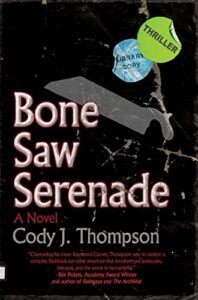
Everyone loves running into and reconnecting with an old friend. Someone you have lost touch with for any number of reasons over the years. It can stir up a cocktail of euphoric emotions through feelings of nostalgia, amusement, hope and love.
That is exactly how Emma Goodwin felt when she ran into her high school best friend Charlie Claymore after they found one another randomly after a decade of not seeing or speaking in a small coffee shop in Seattle.
Soon after their reunion, Emma’s husband Eddie goes missing without a trace of evidence linking anyone to the disappearance. Anguished, she spirals into her old ways with Charlie. When Detective Angus Pratt is assigned to the case, Charlie is determined to stay by Emma’s side, casting a dark veil over her he calls protection.
As they close in on the truth, a sinister plan is revealed that is darker and more terrifying than the vast, uninhabited woods that lay on the outskirts of town. Angus will stop at nothing to find the truth, and Emma may learn the hardest truth of them all. That the flames you hold the closest always burn the worst.
To purchase Bone Saw Serenade, click any of the following links: Amazon, Barnes and Noble, IndieBound+ other linksBone Saw Serenade — the InterviewBone Saw Serenade is set in Seattle, what drew you to that town for your debut mystery?I almost moved to Seattle back in the day. It has always intrigued me. I know people say it rains a lot and can be very gloomy more often than not, but that sounds great to me. My favorite kind of weather.
Being born and raised in San Diego, where we don’t really get seasons, it would be a nice change to experience fall and winter where the weather switches. Some of the story does take place in Southern California, as well. I couldn’t have it all happen in my own backyard. I guess its my own little homage to the move that never was. The Emerald City. My attempt to find my own great and wonderful Oz, I guess you could say.
I love this answer! After growing up in San Diego, I moved to Seattle in 1996.
What should readers know about Emma Goodwin, protagonist of Bone Saw Serenade:Emma really has the most to learn from the experiences within the book. She is a wife and mother, though in the beginning, it’s pretty clear she never knew what to expect from those changes to her life, and may have never wanted them to occur in the first place. She is a frustrating and complex person. She can be flighty and forgetful, but is also caring and kind. To a fault in some instances.
Like all of us, Emma is a deep and complex person with many solid qualities as well as faults. Bone Saw Serenade is just as much a redemption story for Emma as it is a thriller/horror story. Sometimes the flames we hold the closest burn the worst. And sometimes it’s a painful lesson to learn.
Tell us about your road to publishing your debut novel:I was the kid in class that said “Writer” when asked what they wanted to be when they grew up. As odd as that may sound, it’s true. It has been my dream as far back as I can remember. Though, for a long time I didn’t let anyone see what I wrote out of fear. Fear of rejection, fear of feeling like an imposter, you name it.
Finally, when we were all locked in our homes due to a worldwide pandemic, and watching the world begin to crumble, I decided I would create my own world. My own little escape from the current world and situation and it worked perfectly for me and my writing process.
I thought of a scenario, which would then become a turning point in the novel, and it gave me the creeps. So, I built on it. Soon, the characters and the story began to take shape, and felt like they were guiding me through the story. And luckily, after being told “no” a handful of times, the book found a home. I couldn’t be more thrilled with the initial reviews and feedback. It really is a lifelong dream fulfilled within those pages.
Your hometown is San Diego, the same place I grew up, how does living in Southern California impact you as a writer?Probably more negatively than positive. As I said, there is pretty consistent weather here year round. You can go to the beach on Christmas. So, it probably adds to procrastination more than anything. It’s sunny out, friends are getting together. Don’t want to miss out, right? You have to break through things like that to sit yourself down and get to work.
Tell us about Beer Night in San Diego:BNiSD is the first and longest running podcast about the craft beverage industry in San Diego County. We have been producing our show for about a decade now.
Myself and my 3 partners get together each week and share beers the way friends do – Yet we tape it. For one reason or another, people seem to enjoy it. We want to add some entertainment to people’s lives, and if we can make someone smile or laugh and maybe brighten their week, mission accomplished.
What are you working on now?My second novel is already complete and in the hands of my awesome publishing group. That book – an homage to the slasher genre – is set to be released in early March. I am really excited about that book coming out and can’t wait to see what people think. I am still working as hard as I can to get Bone Saw Serenade seen and read by as many people as I can. I have also started my third novel, but is it very early in the process.
But you can expect more to come, as I don’t have any plans of stopping or slowing down.
Words of Wisdom for Aspiring Writers:The best advice I received was something like this. The world is full of “why?” Anytime you think of a cool idea or follow a dream, its so easy to find someone – friends, family, social media – who will ask “Why?” Why start a podcast? Why go to cooking school? Why write a book? The answer to this should always be why not!?
People will always be there to tell you no, or an idea is dumb. You have to fight through that noise and scream why not? If you have always dreamed of painting a portrait, or becoming a veterinarian, or writing a book – Go out and do that. Don’t let anything stand in your way whether it be why people or fear.
Fear is what stopped me for most of my life. And we should never allow those outside negative forces keep us from whatever our dreams may be. Go out and create something that didn’t exist in the world yesterday. In doing so, you can make the world a brighter, more creative place for everyone. Who knows? That novel or painting you’re sitting on might inspire the next generation of creative folks. Take the shot.
Fabulous Advice!Author Pet Corner! I have two pitbulls – Rufus and Sidney.
I have two pitbulls – Rufus and Sidney.
They are everything to me. My best buddies.
They are both rescue dogs who were abused prior to us adopting them.
So, my family is big advocates for pet adoption.
Cody J Thompson — Author of Bone Saw Serenade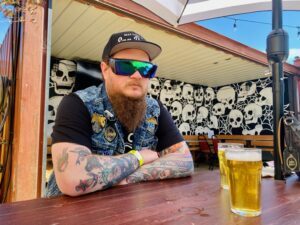 Cody James Thompson is a writer from San Diego, California. He has been writing for many years and is finally diving into the world of novels and story telling.
Cody James Thompson is a writer from San Diego, California. He has been writing for many years and is finally diving into the world of novels and story telling.
Previously, he wrote as a columnist with his work featured in San Diego CityBeat, San Diego Weekly Reader, The Westcoaster Magazine, San Diego Downtown News and he was the staff columnist for San Diego Uptown News writing about the beverage industry.
With storytelling, he focuses mainly on thriller inspired work. When he is not writing or reading, he spends time with his wife and their two pit bulls, cheers on his Golden State Warriors and San Diego Padres and can be found writing, producing and hosting the first and longest running beer podcast in San Diego, Beer Night in San Diego.
He is the author of “Bone Saw Serenade” as well as an upcoming horror novel to be release March 9, 2023.
To learn more about Cody, click on any of the following links: Facebook, Instagram, Twitter & GoodreadsElena Taylor/Elena Hartwell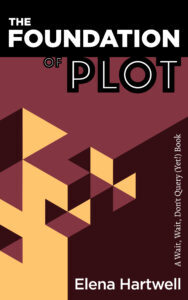
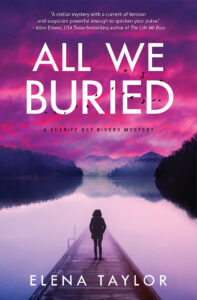 All We Buried, available now in print, e-book, and audio.
All We Buried, available now in print, e-book, and audio.
Silver Falchion Award Finalist, Best Investigator
Foreword INDIE Award Finalist, Best Mystery
The Foundation of Plot, a Wait, Wait, Don’t Query (Yet!) guidebook.
Header photo by LUM3N on Pixabay
The post Bone Saw Serenade: Debut Thriller appeared first on The Mystery of Writing.
November 14, 2022
Painter of the Damned: A New Thriller
Painter of the Damned, the latest release by Rob Samborn
Author Interview + Book & Author Info + Author Pet Corner!Find out more about Rob Samborn’s writing with this spotlight on his novella, The Swordsman of Venice. Click the link here.Painter of the Damned
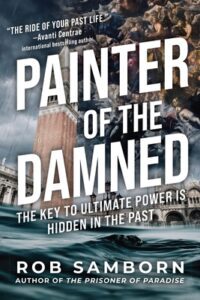 A soul mate trapped in purgatory.
A soul mate trapped in purgatory.
Dangerous alliances.
The quest for ultimate power.
After escaping Venice with their lives, Nick & Julia O’Connor have one goal: return home so they can end their nightmare vacation. But before they reach the American consulate, they’re captured by Interpol and returned to Venice.
Behind Nick’s detention is Salvatore della Porta, the corrupt head of an ancient, enigmatic order that controls Paradise, Tintoretto’s Renaissance masterpiece that’s also a purgatory for thousands of souls—including Nick’s soul mate from the 16th century.
Della Porta believes Nick’s previous life knows the location of a book lost to the ages. This mysterious manuscript will bring him world-changing power—or topple the order.
As Nick’s link to the past consumes him, it’s up to Julia to save her husband and crush della Porta. But with friends in short supply, she must enlist Carlo Zuccaro, unaware the young artist is the order’s new Painter and warden of the damned.
To purchase Painter of the Damned click on any of the following links: Amazon, Barnes and Noble & IndieBound
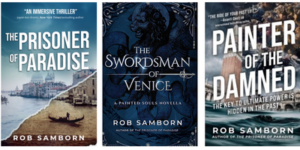
Nick and Julia O’Connor are Americans who travel to Venice, Italy for a dream vacation, only for it to quickly devolve into a nightmare. We meet Nick & Julia in The Prisoner of Paradise, but the story in Painter of the Damned quickly catches us up. Both 28, from Boston, the O’Connors are happily married and feel they were destined for each other. When Nick comes to believe that his true soul mate is not Julia, but a woman whose soul has been imprisoned in the world’s largest oil painting for 450 years, their relationship unravels very quickly.
Julia worries for her husband’s sanity, but Nick is adamant it’s all real. He discovers an ancient secret religious order that has developed a method of extracting people’s souls, which they trap in the painting as a purgatory of sorts. Nick is desperate to save his beloved from another life, but freeing her means liberating the hundreds of souls in the ethereal prison.
After escaping Venice with their lives, Nick and Julia have one goal: reach the American embassy in Milan and return home. That goal is short-lived, as they’re picked up by Interpol. Nick is wanted for questioning in the disappearance of a high-profile individual and they need to return him to the scene of the crime… Venice. The head of the order is behind their apprehension. He believes Nick’s past life holds the key to unheard of power. Against all odds, it’s up to Julia to save her husband and bring down the order.
Painter of the Damned has a paranormal aspect to it, describe how that plays a role in the novel:The paranormal aspect is the concept of souls being extracted from one’s body and then imprisoned in Jacopo Tintoretto’s Renaissance masterpiece, Paradise.
There’s an additional paranormal aspect, but I don’t want to spoil it for the reader. Otherwise, everything else is set in the real world, including all the locations, the paintings, and historical figures.
Tell us about the research process for Painter of the Damned and The Prisoner of Paradise, how did you go about researching Venice in the 16th century?I had been to Venice twice before writing the manuscript and then took a research trip to Venice. I rented a 16th century apartment and spent a great deal of time exploring the city and all the main locations. Additionally, I’ve spent hundreds of hours researching in books and on the internet.
In addition to writing novels, you are also a screenwriter, entrepreneur, avid traveler, artist, and musician. Tell us about some of the other things that take up your time.Fortunately, I’ve managed to find 28 hours in each day, but I’m not telling anybody my secret. These extra four hours enable me to also have a day job and a family.
I’m the Director of Sales for Pulselight, a healthcare data analytics software company, and I have a seven-year-old daughter. The furniture making has been put on hold for a bit. I previously made a couple of tables. These days, it’s not really furniture, but I built a new fence and a “glamping house” for my daughter.
What are you working on now?Two projects. One is the follow-up to Painter of the Damned, which will be the third book in the Painted Souls series. The other is a screenplay adaptation of my friend and fantastic author Laura Kemp’s riveting paranormal thriller, Evening in the Yellow Wood. Her book is amazing and I think will make an incredible movie.
Words of Wisdom for Aspiring Writers:Read, read, read, learn, learn, learn, write, write, write. Read The Foundation of Plot. Read it again. (Awww, shucks, thank you!)
 Bayli!
Bayli!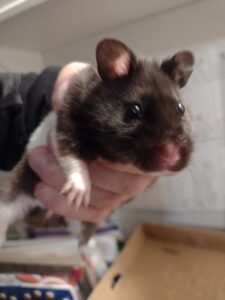 Oreo!Author Pet Corner!
Oreo!Author Pet Corner!Meet Bayli, an 8-year-old lab/border collie mix,
and Oreo, an 8-month-old Syrian hamster.
Rob Samborn — Author of The Painter of the Damned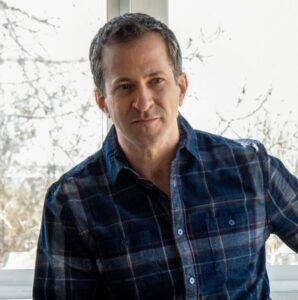 In addition to being a novelist, Rob Samborn is a screenwriter, entrepreneur and avid traveler.
In addition to being a novelist, Rob Samborn is a screenwriter, entrepreneur and avid traveler.
He’s been to forty countries, lived in five of them (including Italy) and studied nine languages.
As a restless spirit who can’t remember the last time he was bored, Rob is on a quest to explore the intricacies of our world and try his hand at a multitude of crafts; he’s also an accomplished artist and musician, as well as a budding furniture maker. A native New Yorker who lived in Los Angeles for twenty years, he now makes his home in Denver with his wife, daughter and dog.
For more information visit www.robsamborn.com or click on any of the following links: Facebook, Instagram, Goodreads, Twitter, Tiktok & BookbubElena Taylor/Elena Hartwell

 All We Buried, available now in print, e-book, and audio.
All We Buried, available now in print, e-book, and audio.
Silver Falchion Award Finalist, Best Investigator
Foreword INDIE Award Finalist, Best Mystery
The Foundation of Plot, a Wait, Wait, Don’t Query (Yet!) guidebook.
Header image on Pixabay.
The post Painter of the Damned: A New Thriller appeared first on The Mystery of Writing.
November 12, 2022
Hero Haters: New Thriller
Hero Haters, the latest thriller by Ken MacQueen
Guest Post + Book & Author Info + GiveawayDon’t miss any book tour posts! Click the link here.Hero Haters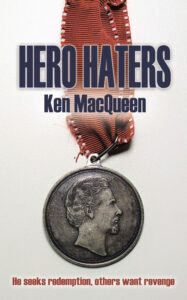 He seeks redemption, others want revenge
He seeks redemption, others want revengeJake Ockham had a dream job, vetting nominees for the Sedgewick Medallion-the nation’s highest civilian award for heroism. His own scarred hands are an indelible reminder of the single mother he failed to pull from a raging house fire; her face haunts him still. Obligations drag him back to his hometown to edit the family newspaper but attempts to embrace small-town life, and the hot new doctor, are thwarted by unknown forces.
The heroes Jake vetted go missing and he becomes the prime suspect in the disappearances. Aided by resourceful friends, Jake follows a twisted trail to the Dark Web, where a shadowy group is forcing the kidnapped medalists to perform deadly acts of valor to amuse twisted subscribers to its website. To save his heroes, Jake must swallow his fears and become one himself…or die in the attempt.
Genre: Adult Thriller
Published by: The Wild Rose Press, Inc
Publication Date: October 2022
Number of Pages: 366
ISBN: 9781509243853 (ISBN10: 1509243852)
“An edge of your seat thriller. MacQueen, a journalist, ratchets up the suspense and tightens the grip to the explosive end.”
—Robert Dugoni New York Times Bestselling Author of The Tracy Crosswhite series
“Gripping from the first page. A thrill ride with all the right moves.”
—Rick Mofina USA Today Bestselling Author
To purchase Hero Haters, click any of the following links: Amazon | Barnes & Noble | GoodreadsWORKIN’ THE IDEA MINEBy Ken MacQueen“Where do you get your ideas?”
This is a favorite question at writers’ conferences, one sure to elicit an eye-roll from the more jaded of authors. As for me, having just ushered my debut thriller Hero Haters into the world, I have neither the right, nor the desire to become jaded. Besides, it’s a totally legit question, one I’m happy to attempt to answer.
Like many authors, I keep a fat file of clippings of news reports: the bizarre, the venal, the unusual, the troubling, or the profound. I call my file cabinet the Idea Mine. I keep a similar digital file on my laptop. These are seeds with sufficient fertilizer—Okay, let’s be honest, buried in a big dollop of BS—that could grow into pieces of fiction. Usually, they benefit from a second idea, a subplot, grafted on. By the time the writer is finished mucking about, the original ideas are barely recognizable, but they are the inspiration.
I spent my working life as a reporter, toiling in the fields of truth. Many of the ideas in my file are from my own stories. I’ve reported on serial killers, and terrorist acts. I froze my butt off in a tent at a research station near the North Pole, covered an earthquake in San Francisco, a riot in Los Angeles, an oil spill in Alaska, and nine Olympic Games.
I made Jack Ockham—my Hero Haters protagonist—a rower because I’ve known many of them over the years; watched their sweat and pain in training, saw them on and off Olympic podiums in Athens, Beijing and London. So, I made Jake a rower, possibly Olympic bound. Then I contrived to kill his dream. Cruel, huh? I’ve interviewed people at their best, my favourite sort of story, and at their worst. All of this is grist for the fiction mill, an apprenticeship of sorts.
So someday I may write about a particular bar in Valdez, Alaska, where things went bad. Or the exhausted, no-nonsense Vietnam veteran who was trauma director at the overwhelmed Martin Luther King Medical Center in Watts during the Rodney King riots. (No, not a riot he told me, it is an “uprising.”) Or about the woman who befriended her father’s killer. If I do, I may relocate that bar, the Black trauma director may become Hispanic, the woman who lost her dad may plot to murder her father’s killer. It’s fiction now, different rules apply.

I write what I read, which is mysteries and thrillers in the main. Many of my favorite authors were reporters who draw from their own deep wells of experience to nourish their ideas. Among them: John Sanford, Carl Hiaasen, Linwood Barclay, Rick Mofina, Michael Connelly, Ernest Hemingway and Val McDermid, to name but a few. Their strengths include an ability to research, and to root their ideas in just enough reality to make their fiction realistic. They also know, as I knew, that there is no such thing as writer’s block—not with an editor leaning over your shoulder, and the presses waiting to roll.
Where do I get my ideas?
Go for a walk. Open your eyes.
I offer you this gift, a plaque I found on a park bench on a recent Sunday walk.
It lifted my spirits. There’s a heck of a story on that bench. Write it.
Except from Hero HatersPrologueSpokane, Washington, August 2019
Local hero Anderson Wise can’t remember the last time he paid for a drink at Sharkey’s.
Nor can he remember an embarrassing assortment of the women who selflessly shared their affection, post-Sharkey’s.
As for that last blurry night at the gin mill, he wished to hell he’d stayed home.
The bar’s owner, Sharon Key, hence Sharkey’s, took joy in chumming the waters on Wise’s behalf for a regular catch of what she called “Hero Worshippers.”
She saw getting him laid as partial repayment for saving her eleven-year-old grandson Toby’s life some eighteen months back.
A disaffected dad, high on crystal meth, stormed into Toby’s classroom to take issue with his kid’s latest report card. He showed his displeasure by shot-gunning the teacher, then reloaded and asked all A-students to identify themselves. Being A-students, they dutifully raised their hands, Toby among them.
As the high-as-a-kite shooter herded the high achievers to the front of the class, Wise, the school custodian, charged into the room armed with a multipurpose dry-chemical fire extinguisher. He blasted the shooter with a white cloud of monoammonium phosphate, to minimal effect, then slammed the gun out of his hands. It discharged into the floor sending several pellets into Wise’s left foot. Thoroughly pissed, Wise ended the drama by pile-driving the extinguisher into the shooter’s face.
Sharon Key, a widow in her early sixties, subsequently replaced the beer signs and dart board with blow-ups of the laudatory press Wise earned during the tragic aftermath. The front of the next day’s local paper held pride of place. It carried a photo of Wise, extinguisher in hand, under the headline: Greater Tragedy Averted as Hero Janitor Extinguishes Threat. The story contained a pull quote in large font which Wise came to regret: “ ‘It’s a versatile extinguisher,’ the modest 30-year-old explained, ‘good for class A, B and C fires—and meth-heads’.”
Said famous extinguisher now guards the top-shelf booze behind Sharkey’s oak-and-brass bar.
New stories were added to Sharkey’s wall five months back after Wise was awarded, with much publicity, the Sedgewick Trust Sacrifice Medallion— one of the most prestigious recognitions of heroism that American civilians can receive.
Wise’s liver and a lower part of his anatomy took a renewed pounding in the weeks thereafter. So much so he declared a moratorium on visits to Sharkey’s for reasons of self-preservation.
He was back in the saddle a month now, but his attendance was spotty. “This hero stuff,” he confided to Key one night, while slumped in his chair. “Maybe it’s too much of a good thing?”
“Ya think?” Key muttered as she took inventory of that night’s limited offerings.
It wasn’t just the women. Men often bought him drinks too, happy to bask in the reflected glory of a proven manly man.
Two weeks ago, some weedy academic from back east interviewed him at Sharkey’s and staked him to an alcohol-fueled dinner at the city’s best chop house. The brainy one expected Wise to opine on such things as “neo-Darwinian rules for altruism.”
Asked him if he’d been motivated by “a kinship bond” with anyone in the room?
Er, no.
Wondered if Wise knew that a disproportionate number of risk takers are working-class males?
Nope, sorry.
And had he calculated in the moment that a heroic display of “good genes” would make him a desirable mating partner?
Cripes. Really?
“Don’t know what I was thinking,” Wise said, swirling a glass of something called Amarone, a wine so amazing angels must have crushed the grapes with their tiny, perfect feet. “Heard a gun blast, grabbed the fire extinguisher off the wall. Saw the dead teacher, all those kids, and a nut with a shotgun. Did what anybody would do. I spent three years in the army after high school, mostly in the motor pool. Much as I hated basic training, maybe some of it stuck. Who knows?”
The academic gave a condescending smile and called for the bill, his hypothesis apparently confirmed.
Wise fled to the restaurant toilet and took notes on the back of his pay slip. Back home, he Googled the hell out of studies on “extreme altruist stimuli,” on “empirical perspectives on the duty to rescue,” and after many false starts, on theories of “Byronic and Lilithian Heroes.”
He kinda got the concept of “desirable mating partner”, but he was pretty sure his dick didn’t lead him into that classroom. Did it?
While not a reflective guy, Wise had to admit it was creepy to reap the fleshy benefits of his few seconds of glory while his dreams were haunted by visions of teacher Adah Summerhill slumped over her desk, blood pooled beneath her. So much blood. With the shooter sprawled unconscious, Wise gently lifted Adah’s head.
She had no pulse and her eyes, once so vibrant and expressive, were as empty as an open grave. She’d always been nice, and totally out of his league.
So, here he was, back at Sharkey’s, mind made up.
Key arrived at his “courting table” and set down his Jack and ginger ale.
“Gave my notice at the school,” he told her. “Getting outta here for a while. Got that Sedgewick money to spend. Someplace they don’t know me. Mexico, maybe.
Or Costa Rica.”
Key patted his hand. “Knew this was coming, Andy.
You banged every eligible female in town, pretty much.
And some who shoulda been out of bounds. I’m amazed the Tourist Bureau doesn’t list you as a top-ten attraction, up there with the botanical gardens.”
“All I want, Shar, is to be liked for me, not for something I did because I happened to be in the wrong place at the right time. Or is that the other way ’round?”
“Hey, you’re a good-looking guy. Still got that shaggy blond baseball player thing going for ya.
Might’ve taken a run at you myself if my hips weren’t shot.” She patted his cheek. “Made you blush. Now don’t turn into a beach bum down there. Always thought you aimed too low, mopping floors and washing windows for the school board. Time to stretch—”
She craned her neck toward the door after it opened with a bang. “My, my, here’s one for the road. She was in earlier, asking after you.” Key aimed a nod at the door and whispered, “Don’t strain anything.” And headed to the bar.
Wise looked up and…sweet Jesus.
Early twenties, he guessed. His eyes roamed from strappy sandals, up a long expanse of tanned bare legs to a glittering silver dress that started perilously high-thigh and ended well below exposed shoulders. The ripe promise of youth was on full display, like she’d dipped her bounteous curves in liquid lamé.
She drew every eye in the place as she undulated to his table. Full red lips, high cheekbones, chestnut hair piled high. Up close now, her gimlet eyes were at once innocent and knowing, like a debauched choirgirl.
“Hi, hero.” Her voice was low and sultry, as he knew it would be. She remained on her feet, hands on the table, leaning low to full effect. “When you finish that drink, I really want to see your medal.”
**** He remembered her mixing drinks back at his apartment while he retrieved his medallion from the sock drawer in his bedroom. He remembered her running a sensuous thumb over the bas-relief portrait of Philip Sedgewick as she read aloud the inscription: “The most sublime act is to set another before you.”
That wondrous voice lingering over “sublime act,”
like it was lifted from the Kama Sutra.
And like too many times, post-Sharkey’s, damned if he could remember her name—that evil bitch. He awoke, bouncing in the back of a van, hands and legs cuffed to rings set in the floor. A broken-glass headache served notice of every bump in the road.
Another lost night at Sharkey’s.
Wise had a dreadful feeling he’d never be back.
Chapter One Aberdeen, Washington, July, one month earlier Jake Ockham was one kilometer in, one kilometer to go and already in a world of pain. Lungs, legs and palms, always the damned palms, screaming enough already.
He’d whaled away on his Concept II rowing machine for thirty minutes, building up to this. Stripped off the sweatshirt after ten minutes, the t-shirt after twenty-five. Down now to running shoes and gym shorts, his torso gleaming with sweat despite the morning chill.
He’d rested after a thirty-minute warm-up to gulp water and to consider the need to reinforce the pilings under the creaky wooden deck before it dumped him and the ergometer into the Wishkah River below. Might leave it in the river mud if it came to that.
Full race mode now, one kilometer in, another to go.
The erg’s computer showed the need to pick up the pace to break the six-minute barrier, something he’d regularly shattered a decade ago during his university rowing days.
Thrust with the legs, throw back the shoulders, arms ripping back the handle. Return to the catch and repeat.
Five hundred meters to go. Eyes fixed on a duck touching down on the river, looking anywhere but the screen.
Two hundred and fifty meters. Faster. Harder. Don’t lose the technique.
Fifty meters. You can do this.
A final piston thrust of legs, shoulders, arms and…six minutes, thirteen seconds.
“Fuck!” His roar startled the duck into flight.
He slumped over the machine, gasping for air, ripping at the Velcro tabs of his gloves, throwing them on the deck in disgust. Hated those damned gloves, so essential these days.
Head bowed, he heard the cabin’s door rasp open.
“Such language.” Clara Nufeld, his aunt, and technically his boss as publisher of the Grays Harbor Independent, leaned against the doorframe.
He didn’t look up. “Don’t bother knocking. Make yourself at home.”
“I did, and I am. Got a couple of things to show you.
Right up your alley. Might be pieces for next week’s issue.”
She was lean and tall, in tight jeans and a faded Nirvana sweatshirt, her spiked white hair cut short. At sixty-four, she still turned heads. Jake knew her age to the day, Clara being his mother’s identical twin. Connie, his late mother, fell to breast cancer at age forty-five.
So much of his mother in Clara. So much that when Jake finished high school and rode his rowing scholarship east to Pittsburgh’s Carnegie Mellon University, his father, Roger Ockham, moved his accounting business to Bend, Oregon. Said it was for the golfing, but Jake suspected the sight of his late wife’s twin was a constant reminder of his loss.
Connie and Clara, fresh out of university, worked for their father at the Independent, Clara on the advertising side, Connie as a reporter.
They took the helm of the paper after Derwin Nufeld—their dad, Jake’s grandfather—collapsed and died mid-way through crafting a fiery editorial on a mule-headed decision to pull The Catcher in the Rye from the high school library.
After Connie’s death, Clara did double duty as editor and publisher until she succeeded six months ago in luring Jake home to Washington State from Pittsburgh to take over as editor-in-chief.
This five-room stilt home, Clara’s former cottage on the tidal Wishkah, was his signing bonus.
One of the dwindling numbers of real estate ads in the Independent would describe the cabin something like: “A cozy oasis on the Wishkah, surrounded by nature and just minutes from the city. Fish from your deck while contemplating the possibilities for this prime riverfront property. A bit of TLC gets you a rustic getaway while you make plans for your dream home.”
After years in urban Pittsburgh, he awoke now to bird chatter and the sights and scents of the moody, muddy Wishkah—its current pulled, as he was pulled, to the infinite Pacific.
Jake gathered his shirts and gloves and cringed at a sniff-test of his underarms. “I’ll keep my distance.” He waved Clara inside. “What’s up my alley?”
She waved two dummy pages, the ads already laid out, plenty of blank space for him and his skeleton staff to fill with stories and photos.
Jake was still adjusting to small-town journalism, covering at least one earnest service club luncheon every week, puffy profiles of local businesses, check presentations, city council and school board meetings.
And jamming in as many names as possible. He’d done some summer reporting for the weekly during his high school years, but rowing had occupied most of his time.
Clara handed off a page proof with a boxed advert already laid out. “A new doctor is taking over old Doc Wilson’s practice, thank God. I swear the last medical journal that old man read was on the efficacy of leeches and bloodletting.”
Jake nodded. Worth a story for sure. A few words from Wilson about passing the scalpel to a new generation, then focus on Dr. Christina Doctorow. No hardship there.
The ad for her family practice included her photo.
Rather than the cliché white coat and stethoscope she wore hiking shorts and a flannel shirt with rolled sleeves, thick dark hair in a ponytail, a daypack hanging off a shoulder. A husky at her side gazed up adoringly.
Smart dog.
Jake put her at early thirties, his age more or less. He nodded approval. “Sporty. A fine addition to the Grays Harbor gene pool.”
“The woman’s a firecracker. Spent ten minutes haggling down the price. I finally caved. Said I’ll bump this up to a half-page, but you owe me a free checkup.”
“Seriously?”
“What she said, too. Also asked ‘Is that ethical?’ I said, ‘darling, I’m in advertising. You want ethics, deal with my nephew on the editorial side.’ “
Jake laughed. “Pretty good at bloodletting herself.
What else you got?”
“This is so up your alley.” She handed him a classified ad page-proof. “You being an expert.”
Jake slumped onto a kitchen chair. “On what?”
She tapped a one-column boxed ad in the lower left, “Heroes.”
“Not hardly.”
He looked closer and reared back. The heading read: “For Sale. Rare Sedgewick Sacrifice Medallion. $100 OBO.”
There was a thumbnail photo of the medal’s obverse, showing the craggy face of Philip Sedgewick, a leading member of the long-dead school of industrialist robber barons. He’d amassed a fortune in textile mills, newspapers, and exploitive labor practices. Awash in cash he came to philanthropy late in life. Like others in this elite group—Carnegie, Mellon, Rockefeller, Vanderbilt, et al—their names and reputation-burnishing generosity live beyond the grave.
Sedgewick, at his wife’s urging, chose to celebrate extraordinary acts of heroism. He used eight of his many millions—an enormous sum in 1901—to endow a family trust to award exceptional heroism with the Sacrifice Medallion and needs-based financial assistance. Over the past one hundred twenty years, the trust awarded some eleven thousand medallions, an inspiring legacy of courage, and yes, sacrifice.
The grainy photo in the classified ad was too small to read the inscription under Sedgewick’s stern visage, but Jake knew it well. It was a quotation by the English poet William Blake: “The most sublime act is to set another before you.”
Below the photo was a post office box address, and “mail inquiries only.”
Jake shook his head. “This is nuts. The price is insanely low, insulting really. The medallions are kinda priceless.”
“I wondered about that,” Clara said. “The ad cost fifty dollars so not much of a profit.”
“The rare few that get to auction can fetch in the thousands. We try to buy them back, prefer that to having them land up in the hands of the undeserving.”
Clara cocked an eyebrow. “We?”
Jake shrugged. “I still do the occasional freelance investigations for Sedgewick. The thing is, there’s never a good reason to sell these. Either the recipient is dead broke, or dead without relatives to inherit it. Or it’s stolen.”
“Or,” Clara said, resting a hand on Jake’s shoulder, “the hero feels undeserving.”
He flinched. “Was there a photo of the medal’s back? It’d have the recipient’s name and the reason it was awarded.”
“Don’t even know who placed the ad. Arrived in the mail: a photo, the ad copy, and a fifty-dollar bill. No return address but the post office box.”
“Pull the ad, Clara. I’ll buy it and return the money.
There’s a story here, something’s not right.”
Clara toyed with her car keys. “I feel bad sometimes, guilting you back. Do you miss it, your old life back in Pittsburgh?”
His pause was barely discernable. “Great to be back in the old hometown.”
“Great to earn half the salary you did in the big city?
Great to prop up the family business? Great to be stuck with your old aunt?”
“Aunt doesn’t cover it. I was twelve when Mom passed. You stepped up for Dad and me.”
She looked like she was about to say something, then shook her head and flashed an enigmatic smile. “A topic for another day. Gotta run.”
She leaned across the table, took his hands in hers, running her thumbs lightly over his scarred palms. She raised his hands to her lips for a kiss, then turned for the door.
***
Excerpt from Hero Haters by Ken MacQueen. Copyright 2022 by Ken MacQueen. Reproduced with permission from Ken MacQueen. All rights reserved.
Ken MacQueen — Author of Hero Haters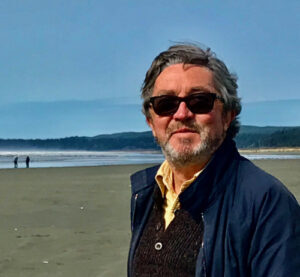 Before turning to fiction, Ken MacQueen spent 15 years as Vancouver bureau chief for Maclean’s, Canada’s newsmagazine, winning multiple National Magazine Awards and nominations.
Before turning to fiction, Ken MacQueen spent 15 years as Vancouver bureau chief for Maclean’s, Canada’s newsmagazine, winning multiple National Magazine Awards and nominations.
He traveled the world writing features and breaking news for the magazine, and previously for two national news agencies. Naturally, he had to make Jake Ockham, his hero, a reporter, albeit a reluctant one.
MacQueen also covered nine Olympic Games and drew Jake’s athletic prowess from tracking elite rowers in training and on podiums in Athens, Beijing and London. He and his wife divide their time between Vancouver, and British Columbia’s Sunshine Coast.
To learn more about Ken, click on any of the following links: KenMacQueen.com, Goodreads, Instagram – @kmqyvr, Twitter – @kmqyvr & Facebook – @kmqyvrVisit all the Stops on the Tour!
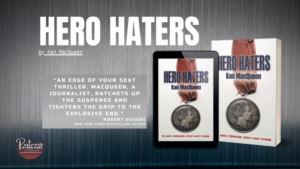
11/09 Showcase @ The Authors Harbor
11/10 Guest post @ The Book Divas Reads
11/12 Guest post @ The Mystery of Writing
11/17 Interview @ Hott Books
11/21 Review @ Novels Alive
11/22 Showcase @ Celticladys Reviews
11/23 Showcase @ 411 ON BOOKS, AUTHORS, AND PUBLISHING NEWS
11/25 Review @ Book Reviews From an Avid Reader
11/29 Showcase @ The Mystery Section
12/01 Review @ Guatemala Paula Loves to Read
12/02 Review @ Melissa As Blog

 All We Buried, available now in print, e-book, and audio.
All We Buried, available now in print, e-book, and audio.
Silver Falchion Award Finalist, Best Investigator
Foreword INDIE Award Finalist, Best Mystery
The Foundation of Plot, a Wait, Wait, Don’t Query (Yet!) guidebook.
The post Hero Haters: New Thriller appeared first on The Mystery of Writing.
November 7, 2022
The Bone Records: New Mystery
The Bone Records by Shamus award winning author Rich Zahradnik
Spotlight + Book & Author Info + ExcerptDiscover more new books! Click the link here.The Bone Records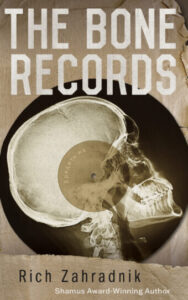 NY Police Academy washout Grigg Orlov discovers an eerie piece of evidence at the scene of his father’s brutal murder: a disc-shaped X-ray of a skull. It’s a bone record—what Soviet citizens called banned American songs recorded on used X-rays.
NY Police Academy washout Grigg Orlov discovers an eerie piece of evidence at the scene of his father’s brutal murder: a disc-shaped X-ray of a skull. It’s a bone record—what Soviet citizens called banned American songs recorded on used X-rays.
But the black-market singles haven’t been produced since the sixties. What’s one doing in Coney Island in 2016?
Grigg uncovers a connection between his father and three others who collected bone records when they were teenage friends growing up in Leningrad. Are past and present linked? Or is the murder tied to the local mob? Grigg’s got too many suspects and too little time. He must get to the truth before a remorseless killer takes everything he has.
To purchase a paperback copy of The Bone Records, click on any of the following links: Amazon, Barnes & Noble & IndieBoundTo purchase a Kindle copy of The Bone Records, click on any of the following links: KindlePraise for The Bone Records“The Bone Records grabs you by the throat on the very first page, then never slows down as it takes you on a wild ride through New York City streets filled with Russian intrigue, underworld crime, police corruption and a man’s desperate quest to avenge his father’s murder. Shamus Award-winner Rich Zahradnik has written a taut, terrifically exciting and thought-provoking thriller.” —R.G. Belsky, award-winning author of the Clare Carlson mystery series
“The plot is not only timely, but utterly unique—a tale of cultures colliding, often with sudden and unexpected consequences, as lonely city claims-adjuster Grigg Orlov spends his long nights chasing down leads on the mysterious disappearance of his father… This is a compelling read, highly recommended.” —LA Times bestselling author Baron R. Birtcher
“A fast-paced thriller set around Coney Island during the tumultuous lead-up to the 2016 presidential election… The Bone Records is a well-crafted mountain of intrigue and non-stop action.” —Bruce Robert Coffin, award-winning author of the Detective Byron Mysteries
“A wonderfully flawed protagonist and a complex mystery combine with current events in Zahradnik’s best novel to date. The Bone Records had me hooked from page one.” —Elena Taylor, award-winning author of All We Buried and the Eddie Shoes mystery series
Excerpt — The Bone RecordsChapter OneFriday, August 19, 2016
Grigg’s reunion with his father was brief—eight minutes to be exact—and ended when a man with a nickel-plated revolver shot Dad twice.
Three hours before the violence began, Grigg struggled through the crowd on the Coney Island subway platform. He was the last to reach the stairway to the station’s exit. Again. Even the old folks were gone. His wrecked knee held him back.
Outside the station, Deno’s Wonder Wheel turned slowly, towering over the amusement park that took its name from the ancient fifteen-story ride. The wheel’s spokes glowed a hot neon white. Hazy coronas surrounded all the lights.
Tick-tick-tick-tick.
Grigg had started wearing his father’s Timex soon after he had gone missing. He put the watch up to his ear, as he’d done too many times before. It wasn’t loud enough to be heard. The clockwork noise was in his head. Maybe a reminder to keep looking. Maybe a reminder that six months was already too long in missing persons cases.
His father’s watch read 8:18 p.m.
He limped away from Coney Island’s amusement parks toward his house on West 28th off Mermaid Avenue. As he did, the street darkened. He checked behind him more than once. The neighborhood became far less amusing as night came on—and the farther you went from the fun parks. Mugging wasn’t the thrill ride Grigg needed. He didn’t want any more trouble. He had a lifetime’s supply. His long days pinballed him between two jobs and the search for his father.
But despite Grigg’s best efforts, the minutes and hours and days kept spinning off the Timex, found by the police in a Howard Beach motel room, the last place his father was seen before he vanished into the thin March air. Their empty house waited to reflect Grigg’s loneliness back at him. His mother had died when he was eighteen months old. His boss at the city’s claims adjustment office rarely talked to him outside of giving orders. All of his connections—he couldn’t really call them friends—in the neighborhood he owed to his father. Dad, like the rest of them, had immigrated from Russia. Unlike the rest of them, he’d married a woman from Jamaica, a union that guaranteed Grigg would always be on the outside in Little Odessa.
The rubber soles of his cheap dress shoes slapped the wet pavement. A thunderstorm had blown through while he was on the subway, leaving behind the sticky-thick humidity. His messenger bag tugged on his shoulder.
He went over the lead he’d uncovered tonight. Going door-to-door in a Midwood apartment building full of Russians, he’d talked briefly to a tenant named Freddy Popov, who recognized Grigg’s father when shown a photo. Popov said a man—maybe a cop—had been canvassing the building with a picture of Grigg’s dad four weeks earlier. Inside the man’s apartment and shielded by Popov, someone said something in Russian. Popov got hinky, then said he didn’t know anything more and slammed the door. Grigg banged on it until a woman across the hall threatened to call the cops. He left with only the knowledge that someone else—maybe a cop?—was also searching for Dad. Still, that bit of info was his biggest lead to date.
Grigg limped up to the small, two-story brick house—kitchen, living room, two bedrooms over a garage—a duplicate of the other attached homes on the street. He unlocked the steel gate, then the front door, and stepped inside.
The thunk of the door closing echoed through the house. Two days ago, Grigg had moved everything out except for the sleeping bag in his bedroom of twenty-seven years and a blue duffel, readying the old house for its new owners. He turned the deadbolt.
He shouldn’t be staying here tonight. He’d spent all his free time on the search for Dad, right up until the closing on the sale of the house. Even at the end, he’d hoped for a breakthrough that would save him from selling. He’d signed the papers yesterday, writing a check for $1,650—most of his savings—because the house was underwater on a second mortgage his father had taken out. Grigg knew the out-of-state buyers wouldn’t be moving in for three weeks, so he’d kept a copy of the key.
Trespassing in my own house. Inviting trouble when I already have too much.
The plan was to use the next three weeks to find an apartment share, but the lead from Popov tugged at his thoughts. Would it pull so hard that he’d spend his free time searching for Dad and end up homeless? He ducked his own question and instead pictured going back to demand Popov tell him more. He shook his head. He could barely keep his mind on his housing problem for the space of a single thought. He took a beer out of the refrigerator, went up to his room, and rolled his sleeping bag into a fat pillow to lean against.
Grigg popped open the 90 Years Young Double IPA. Nine percent alcohol. The strong stuff he’d dubbed “floor softener.” He downed two sixteen-ounce cans, and the ache faded from the muscles in his damaged leg.
He took out his phone. He’d run through his data allowance last week. Three days until the new billing cycle. At least he had his music. He played the Decembrists, their songs about revenge and ships at sea set to jangly indie rock. He followed with the Killers, then Vampire Weekend.
Tick-tick-tick-tick.
His father’s watch read 11:20 p.m.
He opened his notebook and wrote down “Day 191” along with what he’d learned. It was longer than any previous entry—yet not long at all. So many days. The silence in the house chilled him, sending goosebumps in waves over his arms and thighs. He got up and turned down the air conditioner. It wouldn’t help. He missed his father’s voice, the way it had warmed their home. They could talk about everything and anything, a lot of anything, but such interesting anything. Dad was always there with his questions, his curiosity, and his deep interest in whatever Grigg was up to. There were days his father was more intrigued by Grigg’s job than Grigg was. Even that helped.
A fourth beer. He floated on the wood floor of his empty bedroom. Slept.
A thump. The floor hardened underneath him. Another thump. Half buzzed, halfway to a headache, Grigg opened his eyes. He heard it again. Not a dream. On the roof. He followed the steps above him to his father’s empty bedroom. He was about to switch on his phone’s flashlight when legs—silhouetted by the glow from the street across the way—dangled over the room’s tiny balcony. They descended slowly, inching, hesitating, as if the intruder were no expert at this sort of move. The toes stretched to touch, and finally, the person dropped, stumbled, and landed on their knees.
Grigg didn’t know whether to laugh or arm himself. If this was a robbery, then the joke was going to be on a thief who’d picked a house with nothing in it. Grigg decided discretion was the better part of whatever, returned to his bedroom, and pulled the stun gun from his messenger bag. Ever since he’d been attacked when he was in the police academy—suffering the knee injury that forced him to drop out—he hadn’t felt safe unless he carried the weapon.
He placed the messenger bag next to his duffel in the hallway in case he needed to get out fast. In the kitchen, he grabbed his second six pack as a backup weapon.
Of course, he could escape by the front and leave the intruder for the police to deal with. But if he did, then the buyers would be notified, and he’d lose the three weeks of temporary housing he’d been counting on.
He crept through the doorway into the main bedroom.
The figure, whose face remained in deep shadow because of the streetlight glow from behind, rattled the handle to the single balcony door, used his elbow to smash in the square pane nearest the knob, reached in, and turned the simple metal lock. As he pushed the door open, Grigg stepped forward, hit his phone’s light, and thrust forward the stun gun.
“Get the fuck out of my house!”
The figure froze. “I’m not going to hurt you, Grigg.”
Grigg moved closer.
“Dad? Dad!”
Full beard and longer hair, but it was him.
Grigg didn’t know whether to hug his father or scream at him.
“I came to say goodbye,” Dad said.
“Goodbye?”
“I’m leaving. For Russia. I don’t know when I’ll be able to return. It’s the only way.”
“I don’t understand.” Any of it. “You said you’d never go back.”
“It’s the only way to fix things.”
“Things? What things?” Popov’s suggestion about a cop. “Are the police after you?”
A click came from the front door, and Grigg spun. Seeing his father and not an intruder had put the brakes on his fear. Now, his heart raced. He squeezed the handle of the stun gun with a sweaty hand. Keep it together.
The knob turned.
The front door flew open.
Purchase The Bone Records here.Rich Zahradnik — Author of The Bone Records Mystery writer Rich Zahradnik
Mystery writer Rich ZahradnikRich Zahradnik is the author of the thriller The Bone Records and the four critically acclaimed Coleridge Taylor mysteries, including Lights Out Summer, winner of the Shamus Award from the Private Eye Writers of America.
Lights Out Summer won the 2018 Shamus Award for Best Paperback Private Eye Novel. The first three books in the series collected awards in the three major competitions for books published by independent presses. A Black Sail was named best mystery in the 2017 Next Generation Indie Book Awards. Drop Dead Punk received the gold medal for mystery ebook in the 2016 IPPY Awards, while Last Words won the bronze medal for mystery ebook in the 2015 IPPYs and honorable mention for mystery in the Foreword Reviews competition.
“Taylor, who lives for the big story, makes an appealingly single-minded hero,” Publishers Weekly wrote of Drop Dead Punk.
Zahradnik was a journalist for 27 years, working as a reporter and editor in several different media, including online, newspaper, broadcast, magazine and wire services. He held editorial positions at CNN, Bloomberg News, AOL and The Hollywood Reporter.
Zahradnik was born in Poughkeepsie, New York, and received his B.A. in journalism and political science from George Washington University. He lives with his wife Sheri in Pelham, New York, where he writes fiction and teaches kids around the New York area how to publish newspapers. He is providing guidance to the Pelham Examiner, the first community newspaper in New York State managed, edited, reported, and written by people under the age of eighteen.
To learn more about Rich, click on any of the following links: Facebook, Goodreads & TwitterElena Taylor/Elena Hartwell
 All We Buried, available now in print, e-book, and audio.
All We Buried, available now in print, e-book, and audio.
Silver Falchion Award Finalist, Best Investigator
Foreword INDIE Award Finalist, Best Mystery
The Foundation of Plot, a Wait, Wait, Don’t Query (Yet!) guidebook.
Header image by oracast on Pixabay.
The post The Bone Records: New Mystery appeared first on The Mystery of Writing.
November 6, 2022
The Midnight Call: New Thriller
The Midnight Call by Jodé Millman
Spotlight + Excerpt + Book & Author Info + Giveaway!Don’t miss any book tours! Click the link here.The Midnight Call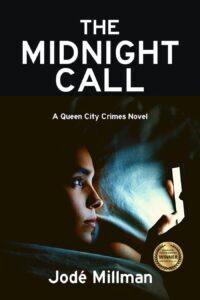 Who would ever suspect that their mentor, teacher, and friend was a cold-blooded killer? Jessie Martin didn’t—at least not until she answers the midnight call.
Who would ever suspect that their mentor, teacher, and friend was a cold-blooded killer? Jessie Martin didn’t—at least not until she answers the midnight call.Late one August night, Jessie’s lifelong mentor and friend–and presently a popular, charismatic, and handsome high school teacher–Terrence Butterfield calls. He utters a startling admission: he’s killed someone. He pleads for Jessie’s help, so out of loyalty she rushes to his aid completely unaware that she’s risking her relationship, her career, and her life–and that of her unborn child–to help Terrence.
Does Jessie’s presence at Terrence’s home implicate her in the gruesome murder of the teenage boy found in the basement? Why does Terrence betray Jessie when he has a chance to exonerate her of all charges? Has he been a monster in disguise for all these years?
To reclaim her life and prove her innocence, Jessie must untangle the web of lies and reveal the shocking truths behind the homicide. The quest turns out to be the fight of her life: to preserve everything and everyone she holds dear.
To purchase The Midnight Call, click the following link: AmazonGenre: Suspense, Thriller, Romantic Suspense
Published by: Level Best Books
Publication Date: September 2022
Number of Pages: 400
Series: Queen City Crimes, Book 1
“I think I killed someone,” the man’s voice whispered across the phone lines.
“Terrence,” Jessie Martin’s voice croaked, husky with sleep. She’d know her mentor’s voice anywhere, anytime, even in the middle of the night. In the pitch darkness she bolted upright in bed and blinked the sleep out of her eyes. “What are you talking about?”
“I’ve done a terrible thing, committed a sin against God,” he said.
The anguish in his voice made the fine hairs on her skin prickle with fear, and her hand flew up with a desire to protect the baby tumbling around inside her swollen belly. Yet, it was the slow, quiet monotone of his voice that frightened Jessie even more than his confession. Her mentor usually had a confident, intense voice that commanded attention. Tonight, it was flat, as if he were no longer aware of reality.
“There’s blood everywhere.” Terrence’s hollow voice cracked. “He was just a boy… a boy. I don’t know how it happened. Oh my God, what have I done?”
Nothing was making any sense. Terrence Butterfield. Her mentor. Her teacher. Her friend. A killer? Impossible. But if what he said was true, the only way for her to help him was to remain cool and calm. She inhaled deeply to repress the panic crushing her chest and blew it out in a slow, cleansing breath as she’d learned in Lamaze class.
She turned toward Kyle’s side of the bed. Empty. She gripped his pillow in her fist. She’d find him in a moment.
“Terrence, how—what happened? Was there an accident?” She tried to control the tremor in her voice.
“No, it was not… an accident.”
Jessie tried to get him to talk, pushed him for more details. It wasn’t normal for Terrence to stay quiet for so long about anything. Ever. So his lengthy, heavy silence only intensified her unease over his vague confession about killing a kid. If she’d gone into criminal law instead of corporate law, the right questions would’ve rolled off her tongue. For now, she’d have to rely on the adrenaline rush and her instincts.
“Just tell me where you are,” Jessie demanded. “Whatever’s happened, I can help you.”
“I’m at home and… I have a gun. I can’t continue to live. I need to make peace with God.”
“Listen to me. Put the gun down.” Jessie’s mind raced. If Terrence had intended to kill himself he wouldn’t have called her. He wanted her to keep him alive. “There are people who love you. Your family, your students —we all love you.”
“I don’t know what to do. I’m so confused.”
“This is what you are going to do.” It felt odd commanding him, reversing the roles so that she was the mentor and he was the pupil. Hopefully, Terrence had enough wits about him to comply with her instructions, but there was no response except for the clicking of his tongue as he wheezed into the receiver. “Just put down the gun and call the police. Tell them there’s been an accident. Don’t say anything else. Are you with me? I’m on my way. I’ll be there in a few minutes. Please don’t do anything foolish. Promise me.”
The cell phone hung like a dead weight in Jessie’s hand as the line went dead. Moist palms stroked the curve of her child in a strong, circular motion. A tiny foot rose up to accept the caresses like a cat seeking to nuzzle, and once sated, the appendage receded into the depths of her womb.
Jessie thought there must be some mistake, but she knew what she’d heard. The stretched-thin quality of his voice convinced her that something was seriously wrong.
Kyle, her fiancé, hadn’t returned to their room, so she called out his name. No answer. Flinging back the covers, Jessie set her bare feet on the cold wood floor and ran toward the dresser.
Get dressed. Find Kyle. Go to Terrence. Before — She didn’t want to consider the possibilities.
“Kyle,” Jessie called out again, rifling through the drawers. Three shirts spilled out onto her feet. She grabbed a striped t-shirt and wriggled into it. It was a bit snug over her belly, but there was no time. She had to go. “Kyle!”
The bedroom door flew open with a crash and Kyle burst into the room, wild-eyed. “Is it the baby?”
“No, no, it’s not me, I’m fine, but we’ve got to go,” Jessie said, yanking on her sweatpants. “Terrence said that he’s killed someone and he’s going to kill himself.” She gathered her flyaway hair into a ponytail and hurried toward the bathroom door, but Kyle stepped in front of her blocking her path.
“You scared me half to death… and this was, yet again, about that old—I mean, about Terrence.”
Jessie flinched and jerked back, glaring at him.
“Let’s a take a second before you do anything crazy and discuss this.” Kyle paused. “Babe, as odd as he is, you don’t believe that Terrence killed anyone, do you?” He raised his eyebrows and cocked his head. When she didn’t respond, he added, “Just in case, why don’t we call the police and let them handle it?”
Jessie shook her head adamantly. “Kyle, there’s no time to get into this right now so please, call my dad. Have him call Terrence.” She shivered uncontrollably from the tension ricocheting through her body, her teeth chattering so violently she believed they’d shatter. “Ma-make him stay on the phone until we g-get there.”
“Come ‘ere.” His tone softened. Kyle encircled her in his arms and a tender hand reached down to embrace their child. She trembled, immune to the warmth of his touch and his soft, cajoling whispers in her ear. “You shouldn’t be running around in the middle of the night.”
“Sweetie, look, I’ve got to go and I’d appreciate it if you came along,” she said, disguising her fear with determination.
After four years together, Jessie knew that Kyle knew better than to argue with her; after all, she was a lawyer. A damn good one, and once she set her mind on something there was no stopping her. It was all part of her job. Her clients demanded it. But this was the first time the call had come before the arrest. And it was the first time the late night call had been from Terrence.
Kyle growled and released her, shaking his head in resignation. “I guess I can’t stop you, can I?” He stepped into the crumpled jeans lying on the floor, then zipped them up and was tugging a Yankees sweatshirt over his head when she disappeared into the bathroom. When she returned to the bedroom, it was empty.
Jessie discovered Kyle downstairs in the kitchen. He shoved his phone into his jean’s pocket and fiddled with her car keys with his free hand.
“Did you call my dad?”
Kyle nodded. “Ready? Come on, let’s go.”
She reached into the pocket of her hoodie and discovered her phone wasn’t there. “Damn, I must have left my phone upstairs. I’ll be right back.”
He twisted his mouth in a soured expression. “Okay. I’ll meet you in the car.”
As she returned upstairs, she tried to remember where she’d last seen her phone. She’d been in such a rush to get ready that she could have set it down anywhere in the bedroom or bathroom. She couldn’t believe she’d been so stupid, especially with Terrence’s life at stake.
Jessie entered her bedroom and gave the room a quick once-over. Her phone was nowhere in sight.
#
Several minutes later, Jessie slipped into the Jeep that was idling in the driveway. Kyle was anxiously tapping his fingers on the steering wheel.
“Sorry I took so long. My phone was under the nightstand. I must have knocked it there when I was getting dressed.”
Kyle grunted, threw the car into reverse, and backed out of the driveway.
Jessie’s eyes were drawn to the keychain dangling from her Jeep’s ignition. It contained the motley gray rabbit’s foot that Terrence had bagged on one of the many hunting trips with her father. They’d made an odd couple, her father and the younger teacher, but they had a lot in common, and they’d always come home with a kill or two. After one trip, Terrence had presented the token to her with great flourish on the night before she’d left for law school, attaching it to a Black’s Law Dictionary and a pound of Ethiopian coffee beans. Jessie had kept it with her always for good luck: during finals, the bar exam, and her job interviews. Whenever the fates needed an extra boost.
Now, the sight of the cherished charm made her shudder as it assumed a more grisly visage. She felt sorry for the little critter so brutally killed and felt a twinge of doubt as to whether she really knew the man who’d been on the other end of the line—the patient friend who’d spent his Saturday mornings laboring with her over her college admission essays, the charismatic bachelor who’d delivered yellow roses on her mother’s birthday, the popular high school teacher who’d brought history to life by dressing as Genghis Khan, George Washington, and Gandhi. And who, ever since she was a teenager, had been the keeper of her deepest secrets and dreams.
For Terrence’s sake, Jessie hoped that he’d been mistaken tonight. Otherwise, he’d need more than her rabbit’s foot to protect him.
Kyle screeched to a halt at the curb in front of Terrence’s home, and she glanced toward the small white clapboard ranch. While the neighboring houses were dark, Terrence’s house shone like a beacon among the Cape Cod cottages nestled along the quiet, tree-lined boulevard in Poughkeepsie, New York. In the humid August night, hazy lights blazed from every window, illuminating the well-manicured lawn and beds of roses and daylilies that she’d helped him plant more than a decade ago.
Terrence’s tall, lean silhouette was framed within the front bay window. He was speaking on the phone, presumably to her father. The front door stood ajar, inviting her to enter.
In the darkness, Jessie glimpsed two black and white cop cars creeping toward them from the opposite direction. With sirens silenced and headlights extinguished, the cars glided toward the far curb and parked. Bathed in the amber glow of the overhead street lamps, the officers were motionless inside their cars.
“Did you call the police?” Jessie asked.
Kyle didn’t answer. “What are they doing?” he whispered, as though the cops could hear.
Jessie eyed Kyle, but there were more pressing matters. “They’re probably waiting for back up. Come on. Let’s go.” She cocked the door handle, but Kyle grabbed her arm and squeezed. She glanced over at him, confused.
“You’re not going out there, Jessie.”
“This is Terrence’s life, Kyle.” Her voice trembled with conviction, fear, and the desire to help the one man she trusted and revered almost as much as her own father. Kyle never understood that before Terrence entered her life, she’d floundered in school. At best, she’d been a B student. Terrence’s energy and enthusiasm had ignited a spark inside her, instilling knowledge, values, and moral lessons that had helped her achieve her goal of law school. She’d had many teachers and professors over the years, and recognized the rarity of such a man. She was deeply grateful to Terrence but Kyle insisted that the man was a fraud.
Jessie started at the sudden sound of the patrol cars’ doors banging open like cannon fire. She blinked rapidly to dispel the horrible image unfolding in slow motion. A pair of officers emerged from each vehicle. They drew their guns and strode in the direction of Terrence’s house. Her eyes tracked them through the pools of streetlight dotting the avenue, knowing they were on a collision course with Terrence. She felt paralyzed, like during the surreal seconds before an automobile accident, and the powerlessness of skidding toward the unavoidable impact.
“Come on, Kyle.”
“Please stay in the car, at least until we know it’s safe.”
“Don’t be ridiculous. Terrence won’t shoot us.” Instinctively, Jessie ran a hand over her belly, and in response to the baby’s sharp jab to her ribs, she yanked her arm free from Kyle’s hold. Opening the door, Jessie slid out of the Jeep and sprinted up the sidewalk toward the broad front steps with Kyle trailing on her heels.
“Stop! Police!” commanded a gravelly voice. “Hands up. Over your head, where we can see them.”
Jessie gasped, stopping in mid-stride. She froze in place, the toes of her sneakers flirting with the bottom step of the porch. Fumbling through the pitch darkness, she threaded her fingers in her fiancé’s. Kyle clasped them, tugged her close to his side, and slowly, they raised their joined hands into the air.
“Sir, I’m here to see Mr. Butterfield. I’m an attorney. He’s expecting me,” Jessie shouted. Judging from the cop’s voice, he was still a good fifty feet away. Far enough for her to make a mad dash for the front door. The door was so close, but Kyle’s grip tightened, digging her engagement ring into her flesh.
“Miss, don’t move,” the officer said. “Please remain where you are. For your own safety.”
“It’s all right, Jessica.” Terrence leaned against the doorjamb, swinging the screen door open to the night air. His voice sounded distant, otherworldly, and his fine-boned features were obscured by the night’s shadows. “Officers, please come in.”
The four police officers swarmed past them with their pistols aimed at the waiting figure. Two officers inched their way up the steps onto the front porch, while a few yards away, the other two covered them from the bottom step. As the team passed, Kyle stepped forward, shielding her from danger and obstructing her path to Terrence.
Terrence might need her, she thought, so she skirted around Kyle and waited and listened. She needed to be ready.
“Sir, are you Terrence Butterfield?” an officer asked.
“Yes.”
Jessie had instructed him to keep quiet and sensed that he was about to break the golden rule—never admit anything.
“We’re investigating a report about the discharging of a firearm at this address. Sir, do you have a weapon? Please show me your hands,” said an older officer with a pockmarked face, as he edged another step closer.
Terrence raised his hands over his head. In his right hand, he gripped an old-fashioned revolver, like Jessie had seen in the Westerns. “I think I have killed someone.”
“Terrence, stop talking!” Jessie exclaimed.
As long as Terrence kept his mouth shut, maybe she could salvage the situation. There had to be a reasonable explanation. Maybe there had been some horrible accident. Maybe he’d stood his ground against an intruder. Maybe he was drunk or stoned or he was hallucinating. She needed to know. To hear the truth from him.
“Sir, I’m Sergeant Mike Rossi and this is my partner, Officer Jen Macy.” Rossi crossed the threshold, while Macy signaled for the other team to spread out around the back of the house. Cautiously, Rossi inched his way toward Terrence. “Mr. Butterfield, please set the gun on the floor.”
Terrence’s trembling hand offered him the weapon.
Rossi stepped backward, looking startled by the movement, but keeping his gun steady, trained on his target. “Just do as I say. Put the gun down and place your hands on top of your head.”
“Please take it. I don’t want it.”
On the bottom porch step, Jessie balanced on her tiptoes, craning her neck to spy on the action through the screen door and windows. She held her breath as Terrence and Rossi eyed each other across the barrel of the shiny gun aimed point-blank at Terrence’s chest. Tension seized Terrence’s muscles, accentuating the slight tic along his jaw that appeared only when he felt threatened. It was a sign that he could attack with little provocation, something she’d witnessed more than once when he’d fended off troublemakers in his classroom.
Locked in a stalemate, Terrence and Rossi continued to glare at each other. Time seemed to stand still, interrupted only by the echoes of the midnight freight trains snaking along the banks of the Hudson River.
Jessie’s pulse thrummed in her ears as she watched, too terrified to move.
The seconds ticked by and then, suddenly as if his nerve had drained away, Terrence’s jaw slackened. He lowered his hand and set the weapon on the coffee table to his right. Then, he hung his head and cradled his temples with his hands.
“Drop to your knees,” Rossi shouted, backing Terrence away from the window so that both men vanished from sight.
Jessie inhaled, inviting humid, sweet air into her lungs, and steadied herself against the steps’ banister. “I should really be in there.” She edged her way up to the next step. “He needs me.”
“Let the police do their job, babe.” Kyle’s fingers clamped around her wrist like a vice. His eyes darted to her baby bump, and then they shifted, staring directly into her eyes, concern crinkling his brow.
Jessie’s gaze swung back toward the house, consumed with the frustration that a bizarre tableau was being played out only a few yards away. Helplessly, she listened to doors slamming, footsteps thundering through rooms, and snippets of conversations and commands drifting outside into the night. As hard as Jessie tried, she couldn’t hear Terrence or see him, and she prayed that he was holding up under the pressure. At least Terrence knew that she and Kyle were there for him and had his back.
Relief flooded her when Rossi herded Terrence back into view in the front hallway, but her chest tightened when a voice crackled over the two-way radio dangling from the officer’s belt.
“Sarge, can you read me? You need to see this… down here in the basement. Copy?”
A scowl hardened on Kyle’s face, and his fingers turned to steel bands squeezing her wrist past the point of pain. Jessie flinched, and he released her.
“Keep your eye on Butterfield,” Rossi said to Macy. “I’ll be right back.”
Jessie massaged the shelf of her belly as the baby’s angular limb stabbed deep into her chest cavity. She lowered herself to the dew-covered steps to ease the wooziness engulfing her like fog. The hour. The heat. The rush. It was all catching up with her.
She needed to shake it off. Stay alert and focused for Terrence. He’d always been there for her—the proms, graduations, fender benders, and panic attacks before the bar exam. Now, it was Jessie’s turn. She owed it to him, and herself, to unearth the truth.
“Terrence, we’re still here. Just do as they say,” Jessie blurted, hoping that the sound of her voice would give him the strength to carry on, although her grit was circling the drain.
“Let’s go.” Kyle loomed over her, his mouth pinched at the corners. “You can’t even stay on your feet. You’re tired and there’s nothing more you can do for him. Not tonight.” He offered her a hand.
Jessie glared at him with an anger that recharged her depleted battery. Kyle knew better. Once she committed to a cause, she never budged. “I’ve got to help him get this mess cleared up. There’s been a mistake.”
“A mistake? It looks to me like Terrence finally flipped out and killed somebody. But I can’t expect you to be objective about him. You wanted him to be our kid’s godfather.” Kyle paused, clenching and unclenching his fists. “You know, sometimes Terrence seems like a third party to our relationship.”
Kyle had a way of believing the worst whenever it came to Terrence. It never bothered her when Terrence called to chat about the latest movies or books he’d read or stopped by to watch a football game with Kyle. He was Terrence being Terrence, and she knew that there was no ulterior motive on his part. Ever since she’d been a kid, she and Terrence had been close, and over the years he’d done plenty for her. And she for him. He’d worn many hats in her life—friend, confidante, teacher, mentor, even an uncle—and Kyle had known that from the beginning but Kyle insisted that Terrence was taking advantage of their friendship by calling and popping in uninvited. Why couldn’t he acknowledge that each man had a special place in her life?
Low voices discussed the need to secure the crime scene and call the paramedics, the forensic team, the district attorney, and the medical examiner. Although criminal law was outside her wheelhouse, Jessie knew the working parts of a homicide investigation, so these whisperings confirmed her worst suspicions. First, there was a dead body or bodies somewhere in the house —probably the basement. And second, Terrence was implicated in the homicide.
Suddenly, the screen door swung open, and the dark figure of Terrence Butterfield emerged from the house in handcuffs shepherded by Rossi and Macy. With his head drooped forward against his chest and his limp arms shackled at the wrist, he shuffled across the whitewashed porch and down the entry steps.
Terrence drew closer and the veil of night shadow enshrouding his face and body revealed something much more sinister. His handsome face was smeared with glossy red liquid and his dark brown hair was clumped into a tangled mess. A rank stench, like rotten cabbage boiled in sulfur, emanated from the tattered, bloody shirt clinging to his chest. The smell of death on him hit her like a slap and grew worse with every step he took toward her.
Stifling a gag, Jessie garnered her strength and stepped into their path. She double-checked the name on his silver badge. “Officer Rossi, I know that you’ve got a job to do, but I do, too. Before you take Mr. Butterfield anywhere, I’m putting you on notice that he is not to be interrogated without my being present.” She cleared her throat. “And has he been read his rights?”
Rossi eyed her with contempt, as though insinuating that she had no right to question his actions or authority. “We can discuss that after Mr. Butterfield has been booked.”
“I think that we should discuss it now.” Jessie’s tone was insistent, hard.
Before they could respond, Terrence spoke up, “I believe that I’m entitled to speak with my attorney.”
“You can speak with her down at the station. Move along, Mr. Butterfield,” Macy said, shoving the captive’s shoulder. “Ma’am, please move out of the way.”
For a long moment, Jessie remained stationary, considering how far she could push the cops before she crossed the line. Her heart urged her to defy Rossi and speak with Terrence right then and there, yet her head warned her to follow the protocol. Strategically, the latter would be best for both of them.
“Not a word,” Jessie counseled him as she stepped aside. Terrence stopped before her and gently rested his cuffed hands on the round of her belly. She smiled and cupped her hands over his in reassurance. “Don’t worry. We’ll be right behind you.”
Gazing into his eyes, she searched for the truth, but instead, found cold, dead-fish eyes, and his dry, cracked lips were curled in a crooked, haunting smile. She shrank away from him, huddling against Kyle to steady her buckling knees.
The officers grabbed Terrence’s shoulder, ushered him toward their patrol car, and loaded him into the back seat. The engine started and with lights flashing and sirens blaring, the police car sped off into the night.
Nothing in her thirty years of life had prepared her for this moment. This tragedy.
Terrence’s life was in her hands. And in that instant, Jessie realized that she must follow her heart. She knew the kind, caring friend, teacher, and confidante that he’d been to her. She needed to disregard the blood, the stench, and the nagging worry that he was a cold-blooded killer. She’d prove him innocent. She owed him that.
As the police car taillights disappeared into the darkness, an undeniable dampness seeped onto Jessie’s abdomen. Her eyes widened in horror as she looked down at her sweatshirt. Beneath the Syracuse University logo, a grisly tattoo of handprints smeared across her belly. Jessie flipped over her quivering hands and stared at her palms, black and sticky with blood.
“Oh, my God.”
Purchase the book here! Photo by Evangeline GalaJodé Millman — Author of The Midnight Call
Photo by Evangeline GalaJodé Millman — Author of The Midnight CallJodé Millman is the acclaimed author of HOOKER AVENUE and THE MIDNIGHT CALL, which won the Independent Press, American Fiction, and Independent Publisher Bronze IPPY Awards for Legal Thriller. She’s an attorney, a reviewer for Booktrib.com, the host/producer of The Backstage with the Bardavon podcast, and creator of The Writer’s Law.
Jodé lives with her family in the Hudson Valley, where she is at work on the next installment of her “Queen City Crimes” series —novels inspired by true crimes in the region she calls home.
To learn more about Jodé, her work, and sign up for her newsletter, click on any of the following links: www.JodeMillman.com, Goodreads, LinkedIn, BookBub – @JodeMillmanAuthor, Instagram – @jodewrites, Twitter – @worldseats & Facebook – @JodeSusanMillmanAuthorVisit all the Stops on the Tour!
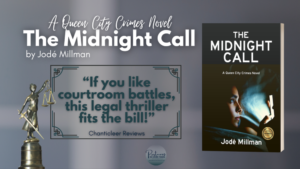
10/03 Showcase @ BOOK REVIEWS by LINDA MOORE
10/04 Guest post @ The Book Divas Reads
10/06 Interview @ I Read What You Write
10/08 Review @ Reading Is My SuperpPower
10/10 Review @ Guatemala Paula Loves to Read
10/11 Showcase @ Books, Ramblings, and Tea
10/12 Guest post @ Mystery Review Crew
10/15 Showcase @ Silvers Reviews
10/19 Review @ Book Reviews From an Avid Reader
10/20 Review @ Novels Alive
10/21 Review @ Jersey Girl Book Reviews
10/24 Review @ Nesies Place
10/25 Showcase @ Pick a Good book
10/26 Review @ mokwip8991
10/28 Review @ Celticladys Reviews
11/13 Review @ Felicia Is Booked
11/14 Review @ Paws. Read. Repeat
11/18 Review @ Melissa As Blog

 All We Buried, available now in print, e-book, and audio.
All We Buried, available now in print, e-book, and audio.
Silver Falchion Award Finalist, Best Investigator
Foreword INDIE Award Finalist, Best Mystery
The Foundation of Plot, a Wait, Wait, Don’t Query (Yet!) guidebook.
The post The Midnight Call: New Thriller appeared first on The Mystery of Writing.
November 2, 2022
The Hunt for The Peggy C: Thriller
The Hunt for the Peggy C, debut historical thriller by John Winn Miller
Author Interview + Book & Author Info + Author Pet Corner!Don’t miss any author interviews. Click the link here to read more.The Hunt for the Peggy C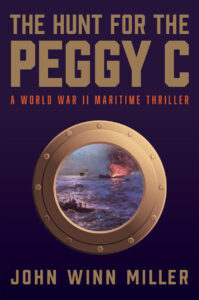 John Winn Miller’s THE HUNT FOR THE PEGGY C, a semifinalist in the Clive Cussler Adventure Writers Competition, captures the breathless suspense of early World War II in the North Atlantic. Captain Jake Rogers, experienced in running his tramp steamer through U-boat infested waters to transport vital supplies and contraband to the highest bidder, takes on his most dangerous cargo yet after witnessing the oppression of Jews in Amsterdam: a Jewish family fleeing Nazi persecution.
John Winn Miller’s THE HUNT FOR THE PEGGY C, a semifinalist in the Clive Cussler Adventure Writers Competition, captures the breathless suspense of early World War II in the North Atlantic. Captain Jake Rogers, experienced in running his tramp steamer through U-boat infested waters to transport vital supplies and contraband to the highest bidder, takes on his most dangerous cargo yet after witnessing the oppression of Jews in Amsterdam: a Jewish family fleeing Nazi persecution.
The normally aloof Rogers finds himself drawn in by the family’s warmth and faith, but he can’t afford to let his guard down when Oberleutnant Viktor Brauer, a brutal U-boat captain, sets his sights on the Peggy C. Rogers finds himself pushed to the limits of his ingenuity as he evades Brauer’s relentless stalking, faces a mutiny among his own crew, and grapples with his newfound feelings for Miriam, the young Jewish woman whom, along with her family, he must transport to safety.
In the end, Rogers makes the ultimate sacrifice to save the people he has grown to love – he uses his beloved ship and the highly explosive fuel it is carrying to vanquish Brauer for good. THE HUNT FOR THE PEGGY C is a masterpiece laced with nail-biting tension and unexpectedly heartwarming moments that any reader, not just fans of naval fiction, will enjoy.
To purchase The Hunt for the Peggy C, click on any of the following links: Amazon, Barnes and Noble & IndieBoundThe Hunt for the Peggy C — Author Interview with John Winn MillerThe Hunt for the Peggy C is set at the beginning of World War II. What drew you to writing about that time period?Believe it or not, I have no idea. My debut novel was a dream project—literally. Years ago, I had been watching a terrible action-adventure movie (I don’t remember which one) with my young daughter Allison (who now plays Maggie on ABC’s A Million Little Things), and I kept telling her, “I know I could write a better script than this.” That night I had a dream, and when I woke up, I knew the first and last scenes and the name of the ship. That was all.
So, like Michelangelo used to say, I knew there was a figure in that block of stone—in my case, a story—and all I had to do was spend years trying to chisel it free. The Hunt for the Peggy C screenplay and other scripts and a TV pilot I wrote attracted some interest in Hollywood but no sales.
When COVID hit, and my wife Margo and I were stuck at home with our two standard poodles and Maine coon cat, I decided it was time to live up to the dream that had been the reason I had become a journalist: to learn how to write so I could become a novelist.
Tell us about your research process for The Hunt for the Peggy C:When I retired from journalism for the first time (a.k.a. took a buyout), I was determined to be a screenwriter. So I took online courses, attended conventions, and read countless books on screenwriting. I found it to be quite different from writing news stories. It was more like haiku with short, cryptic descriptions and sparse, often misleading dialogue, and scenes were limited to only what could be seen on screen.
I repeated the same process when I wanted to write a novel because it is so different from screenplays and news stories. The possibilities for point-of-view, descriptions, internal dialogue and plot structure are endless.
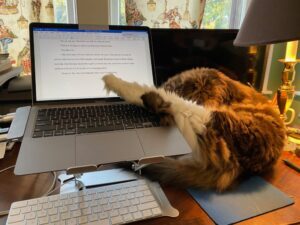 Violet is John’s toughest critic
Violet is John’s toughest criticThen I had to learn about my subject. I have read countless books about World War II since I was young. But I had never been on a U-boat or a tramp steamer, and I knew next to nothing about the sea. As a result, I spent months reading histories, websites, historical archives, and first-hand accounts and watching documentaries and YouTube videos. I wanted all the history and technical details—and there are a lot of both—to be accurate. I even went so far as to study wartime logs by U-boat captains so I could accurately describe the moon’s stage during each phase of the chase at the heart of The Hunt for the Peggy C.
I was lucky to have several former sailors—including two submarine officers and my college roommate—double-check my naval descriptions and lingo. One of my Jewish cousins was kind enough to read a draft to ensure I was accurate and not inadvertently offensive. Plus, I hired a doctoral student from the Department of War Studies at King’s College London to review the manuscript for historical errors. Surprisingly, several readers of my Advance Reader Copy also offered helpful suggestions and corrections.
Finally, I hired Chris Evans, author of wartime novels and former Random House editor, as my development editor. His expertise and writing advice proved to be invaluable.
What would you like readers to know about Captain Jake Rogers, the main character in The Hunt for the Peggy C?The 38-year-old Rogers is a man without a country, having fled the United States after a fight at the US Naval Academy that he feared made him a murderer. He found refuge on the Peggy C, an obsolete but still operating tramp steamer that traveled from port to port in search of cargo, whether legal or not.
As he rose to be captain of the ship, his only home, Rogers became a hardened taskmaster; it took iron discipline to keep in line a crew of often ill-educated, shiftless vagabonds who became sailors after failing at everything else, some including crime.
He also became more cynical about people who claimed to be patriots or bound by a sense of honor. To him, they were suckers lost in the romanticized world of poems and novels, which Rogers secretly consumed at a voracious pace. But when he experienced Nazi-occupied Holland and witnessed first-hand the brutal treatment of Jews, Rogers made a fateful decision, first for money and then, much to his surprise, for love.
It is only after he smuggled a Jewish family out of Amsterdam for a promised colossal reward and gradually fell in love with the eldest daughter Miriam that he came to believe it is more important to do the right thing than the most profitable thing.
You have an extensive background as a writer, including award-winning investigative reporter, editor, foreign correspondent, editor, newspaper publisher, and screenwriter. How did that background help or hinder you as a novelist? John Winn Miller (right) Beirut Civil War
John Winn Miller (right) Beirut Civil WarEach phase of my bizarre career was a learning experience. I learned to write clear, straightforward prose as a reporter. I also learned how to quickly become an expert through research and interviews on almost any subject, especially during my time as an investigative reporter.
As a political reporter, I learned to study character and speech patterns and to pay particular attention to body language. I would subject whatever I was told to rigorous vetting, knowing politicians often flitted in and out of gray areas without remorse.
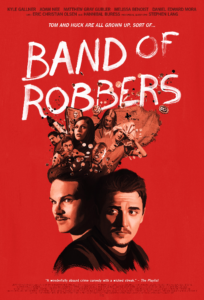 Writing screenplays taught me about character arcs and how to structure a thriller with crisp dialogue and precise descriptions.
Writing screenplays taught me about character arcs and how to structure a thriller with crisp dialogue and precise descriptions.
During my time as a foreign correspondent based in Rome for The Associated Press and The Wall Street Journal/Europe, I developed the habit of using all five senses in reporting.
I would write not only about what someone told me but their tone, what they were wearing, the smell of their cologne or perfume, the setting, the weather, and the historical context. Almost no detail was too small, although many of my observations never showed up in my dispatches from Italy or exotic places like India with Pope John Paul II, Bulgaria, or warzones in Eritrea, Chad, and Lebanon.
A Lexington, Kentucky, native, you have traveled and lived in a variety of places before returning to your roots. How have all those places impacted you as a writer? What do you love about living back in your hometown?Everywhere I lived or visited in my far-flung travels had its own personality and spirit, informed as much by the people as the landscape. Imagine sitting in the desert with Eritrean guerrillas, dipping your fingers into a warm pot of sorghum topped with fire-roasted lamb–my meal every day for a week–all while rival guerrilla groups were hunting for us.
Or being awash in a sea of hundreds of thousands of pilgrims—many, if not most, Muslims or Hindus—who traveled for miles to stand in awe of the Roman Catholic leader Pope John Paul II.
Or flying at a moment’s notice into one country after another, interviewing terrorists, hustling to disaster scenes, spending the night atop an erupting Mount Etna, or finding delightful stories everywhere about such things as the seventeen saints named Valentine or the real Maltese Falcon on the island of Malta.
You cannot help but be moved and affected by all those experiences. Perhaps, the greatest impact for me was a greater sense of empathy with the diverse people and places of the world. I think it also sharpened my senses and made me a better writer.
Plus, I was lucky to be raised by parents and grandparents who loved sitting around a roaring fire on holidays, reciting poetry by heart, and telling jokes or incredible true stories about people they knew. It sparked my vivid imagination and made me a voracious reader of history and tales of adventure.
As a result, my home will always be Lexington, KY, the birthplace of five generations of Millers where I grew up, graduated (barely) from the University of Kentucky, and worked at my first domestic newspaper. It is a magical place with white-fenced horse farms dotting undulating hills of bluegrass. There is a lot of culture because of the two universities in town where I taught media literacy courses.
And my childhood friends, my sister, one of my brothers, and many colleagues still live here. Spring and fall are distinct seasons, each with a riot of colors and cool breezes celebrated with afternoons at Keeneland Racetrack, watching a pretty good college basketball team, and enjoying some mighty fine bourbon.
No wonder I keep coming back.
What are you working on now?I stunned myself when I immediately started writing a sequel after selling The Hunt for the Peggy C to Bancroft Press. I was even more stunned when I finished it and began the third volume with many of the same characters in different phases of World War II.
That means I am doing three things at once: publicizing the first book, editing the second one, and writing the third novel. I never intended to do more than one novel. But my publisher, Bruce Bortz, said I should keep writing, and I did.
I am also trying to sell a TV pilot that my brother Harry, a film editor, writer-director John Harrison, and I wrote. You could say I’m staying pretty busy.
Words of Wisdom for Aspiring Writers:Find your own voice. One of the many mistakes I made in early drafts of The Hunt for the Peggy C was trying to write like John le Carré, Donna Tartt, or Tom Wolfe, using brilliantly constructed long sentences replete with semi-colons, metaphors, and pithy asides.
That didn’t work at all.
So, I took lessons from them on style, rhythm, and descriptive writing and used that knowledge to develop my own simpler, fast-paced style with a dash or two of complex sentences.
Great advice!Author Pet Corner! Maisie, Violet (cat) & Gilou!John Winn Miller — Author of The Hunt for the Peggy C
Maisie, Violet (cat) & Gilou!John Winn Miller — Author of The Hunt for the Peggy C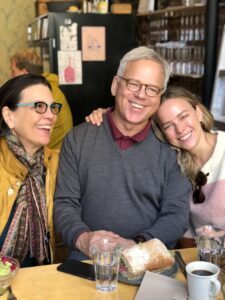 Margo, John & Allison
Margo, John & AllisonJohn Winn Miller is an award-winning investigative reporter (Pulitzer finalist), foreign correspondent, editor, newspaper publisher, screenwriter, movie producer, and novelist. The Lexington, Ky., native also produced four indie films, including Band of Robbers, written and directed by Adam and Aaron Nee (who recently wrote and directed The Lost City).
He has taught Media Literacy classes at his alma mater, the University of Kentucky, and Transylvania University. He is also a second-degree black belt in Shaolin karate.
Miller and his wife, Margo, live in Lexington with two standard poodles and a Maine Coon cat.
Their daughter Allison Miller is an actress-screenwriter-director currently starring in the ABC series A Million Little Things.
To learn more about John, click on any of the following links: Web Site, Twitter, Instagaram & FacebookElena Taylor/Elena Hartwell
 All We Buried, available now in print, e-book, and audio.
All We Buried, available now in print, e-book, and audio.
Silver Falchion Award Finalist, Best Investigator
Foreword INDIE Award Finalist, Best Mystery
The Foundation of Plot, a Wait, Wait, Don’t Query (Yet!) guidebook.
Header image by PubliCo on Pixabay
The post The Hunt for The Peggy C: Thriller appeared first on The Mystery of Writing.
November 1, 2022
A War in Too Many Worlds
A War in Too Many Worlds
Guest Post + Book & Author Info + Giveaway!Don’t miss any book tour posts. Click the link here.A War in Too Many Worlds
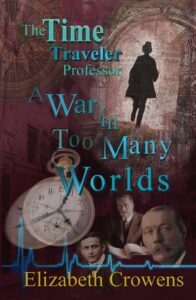 The Time Traveler Professor
The Time Traveler Professor
The secret diaries of John Patrick Scott pick up at the close of 1917. British intelligence sends Scott to work undercover in Berlin with his old partner-in-crime, Wendell Mackenzie, as his outside contact in Paris. Back on the Western Front, Scott discovered his ability to see the ghosts of the dead. Unsure if that’s a blessing or a curse, he takes this one-step further, employing spirits in the world of deception and intrigue. As the Russian monarchy crumbles and the Red Baron meets his final match, for Scott, true love is always beyond arm’s reach. His long-lost patrons and paramours, Sophia and Francois Poincaré, resurface but as potential enemies of the Crown.
Arthur Conan Doyle vows to retrieve his stolen time machine from H.G. Wells. Scott is still at odds with Doyle, who still refuses to publicly acknowledge his contributions for ghostwriting Sherlock Holmes, and Doyle encounters Harry Houdini in the most unlikely of places. Get ready for a wild ride.
Time Traveler Professor, Book Three: A War in Too Many Worlds, pairs murder, mayhem and mysticism in a mashup where The Lost World meets The Island of Doctor Moreau. Stay tuned for Book Four, The Story Beyond Time, the final book in this epic series.Genre: Alternate History / Time Travel
Published by: Atomic Alchemist Productions
Publication Date: August 16th 2021
Number of Pages: 293
ISBN: 9781950384075
Series: Time Traveler Professor, #3
This sounds really silly, but I just turned in a 1940s Hollywood mystery to my agent and realized I used some of the same German last names from A War in Too Many Worlds in my other book. How embarrassing is that? I’d change them in my alternate history book. I guess it’s okay to use a longer and harder to pronounce name when scenes are supposed to take place in German rather than the United States. One of my critics is bound to figure it out. Don’t let it be you. LOL
What can readers who enjoy your book do to help make it successful?Spread the word. Post an excellent review on both Amazon and Goodreads, even if you won the book in a giveaway. I hate to emphasize algorithms and statistics, but that’s how their search engines work. The more reviews, the more an author will get discovered.
What’s on your bucket list?More travel. The pandemic put a real damper on that in the past two years, and it still has, but at least I got to visit Moscow and St. Petersburg before the Ukrainian invasion. I haven’t been overseas since and don’t feel all that comfortable yet. Looks doubtful if I’ll get to China anytime soon given the politics and the pandemic, and India was in dire shape. I still want to go to Tibet and Nepal. We’ll see…
What’s also on my bucket list, having the Time Traveler Professor series made into a streaming series like Doctor Who and being a creative advisor on the project. See below on the casting suggestions.
Your book is a movie! Who’s in your dream cast?Funny you should ask, because I’ve worked in the entertainment industry for many years, so I’m always thinking along those lines.
Arthur Conan Doyle – Hugh Jackman
H.G. Wells – Rufus Sewell, from The Man in the High Castle and Victoria.
Harry Houdini – Michael Weston, played Houdini in the short-lived series, Doyle and Houdini
John Patrick Scott – Our protagonist has been the hardest one to cast. Also when the first book in the series starts out in 1898, he ages, and Book Three, A War in Too Many Worlds starts in late 1917. For a younger version, I’ve had my eye on Robert Sheehan, who plays Klaus in The Umbrella Academy or Timothée Chalamet. For the older versions, Cillian Murphy, from Peaky Blinders. Both are Irish actors, but could play one who is Scottish.
Francois Poincaré – First choice: Sasha Baron Cohen, Second choice: Rami Malek. Francois reminded me a lot like Freddie Mercury. Obviously, Rami played him in Bohemian Rhapsody. Sasha was originally under consideration for that role.
Sophia Poincaré – possibly Marion Cotillard or Michelle Williams
Maria von Braun – Leonie Benesch, a German actress in the recent Around the World in Eighty Days and the television series Babylon Berlin and The Crown.
Leonora Offenbacher – Sarah Silverman
Rebecca Wells – Kate Winslet
Finneas “Finn” Fertle – Matt Smith, from Doctor Who and The Crown
Not sure about Helga, Max Pushkin, and Wendell Mackenzie.
Sounds like fun! Thanks for visiting my blog.Elizabeth Crowens — Author of A War in Too Many Worlds

Currently New York City-based, worked in the entertainment industry in NY and LA for over 25 years. Writing credits include Black Belt, Black Gate, and Sherlock Holmes Mystery magazines, stories in Hell’s Heart and the Bram Stoker Award-nominated A New York State of Fright, and three alternate history/SFF novels.
Recipient of the MWA-NY Leo B. Burstein Scholarship, City Artists Corps / New York Foundation of the Arts grant, a Glimmer Train Honorable Mention, an Eric Hoffer First Prize, two Grand Prize and five First Prize Chanticleer Review awards, including a 2022 Grand Prize in the Chanticleer Review Cygnus Awards for Science Fiction for A War in Too Many Worlds.
To learn more about Elizabeth, click on any of the following links: www.ElizabethCrowens.com, Goodreads, BookBub – @ecrowens, Instagram – @crowens_author, Twitter – @ECrowens & Facebook – @thereel.elizabeth.crowensVisit all the Stops on the Tour!
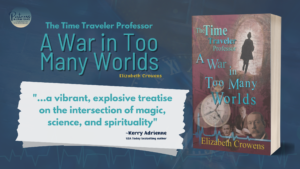
10/17 Showcase @ BOOK REVIEWS by LINDA MOORE
10/18 Showcase @ Silvers Reviews
10/19 Guest post @ The Book Divas Reads
10/22 Showcase @ Just One More Paragraph
10/24 Guest post @ Novels Alive
10/25 Interview @ I Read What You Write
10/30 Showcase @ Nesies Place
10/31 Review @ I Read What You Write
11/01 Guest post @ The Mystery of Writing
11/04 Review @ The Book Connection
11/05 Review @ Book Reviews From an Avid Reader
11/07 Showcase @ Celticladys Reviews
11/10 Guest post @ Hott Books
11/11 Review @ Guatemala Paula Loves to Read
11/20 Showcase @ Books, Ramblings, and Tea

 All We Buried, available now in print, e-book, and audio.
All We Buried, available now in print, e-book, and audio.
Silver Falchion Award Finalist, Best Investigator
Foreword INDIE Award Finalist, Best Mystery
The Foundation of Plot, a Wait, Wait, Don’t Query (Yet!) guidebook.
The post A War in Too Many Worlds appeared first on The Mystery of Writing.
October 28, 2022
Nunzio’s Way: Historical Thriller
Nunzio’s Way, the latest release by Nick Chiarkas
Spotlight + Book & Author Info + Giveaway!Don’t miss any book tour posts. Click the link here.
Nunzio’s Way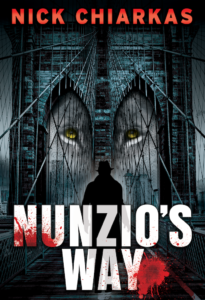 “In this city, you can have anything you want if you kill the right four people.” ~ Nunzio Sabino
“In this city, you can have anything you want if you kill the right four people.” ~ Nunzio SabinoIn Weepers (Book 1), Angelo and his gang, with a bit of help from his beloved “uncle” Nunzio Sabino, defeated the notorious Satan’s Knights. Now, in this standalone sequel to Weepers, it’s 1960 and Nunzio is still the most powerful organized crime boss in New York City, protecting what’s his with political schemes and ‘business’ deals.
Against this backdrop of Mafia turf wars, local gang battles, and political power-plays in the mayoral election, the bodies begin stacking up. An unlikely assassin arrives fresh from Naples after killing a top member of the Camorra to avenge the murder of her family. She blends seamlessly into the neighborhood and with the focus on the threat from the Satan’s Knights, no one suspects that Angelo’s father and Nunzio are next on her hit list.
Nunzio has lived his entire life by the mantra; Be a fox when there are traps and a lion when there are wolves. Will Nunzio be a lion in time?
Genre: Crime Thriller / Historical
Published by: HenschelHAUS Publishing
Publication Date: October 2022
Number of Pages: 261
ISBN: 978159595-908-6
Series: Weepers, #2
Until the lion learns to write, every story will glorify the hunter. — African Proverb
The Devil hath power to assume a pleasing shape. — William Shakespeare
One must be a fox to recognize traps and a lion to frighten wolves. — Niccolo Machiavelli
PROLOGUEFor those who have read Weepers a while ago, and for those who have not read Weepers, here is a brief description of Nunzio Sabino, as told by Father Joe to Father Casimiro (Father Cas) in Weepers.
***
“In 1920… Caffè Fiora was the Baling Hook, a tough bar owned by an ex-longshoreman, Stanley Marco, and his wife Sylvia—who was every bit as tough as Stan. The place was decorated with nets, anchors, and baling hooks hanging all over the walls. It had a long bar and small tables.”
“Sounds charming,” Father Casimiro said sarcastically.
“In a strange way, it was. The booze was good. The food was tolerable. And the dancers were okay—that is, except for one. Fiora Ventosa was a delicate breeze in a cigar-filled room. And when she danced, the room dropped silent. She was sensational.”
“A stripper?”
“Not completely, more burlesque. The dancers would take off this or that but never stripped completely. Each night of the week featured a different dancer. Fiora danced on Tuesday nights. And Nunzio fell in love with her.”
“How old was he?”
“Thirteen. We were all kids about the same age. There were five of us—me, Nunzio, Pompeo—Anna’s father— George, and Nick. We would sneak in every Tuesday night. Sylvia knew, but let it slide.”
“Did Fiora know how Nunzio—”
“Probably. She would sometimes sit with us after her show. Thinking back, she probably thought it was cute, and compared to the rest of the clientele, we were safe, adoring fans. We would sit there and Nunzio would be transfixed. She was seventeen and Nunzio figured a four-year difference wasn’t that much. So, after watching her dance every Tuesday for seven or eight months, on the third Tuesday in January 1920, Nunzio decided to tell Fiora he wanted to marry her. Seems silly now, but back then…what did we know? Anyway, Nunzio had to work late, so we waited for him and then we beat it over to the Hook.”
Father Casimiro loved these stories. They gave him a history, like he belonged to the neighborhood. “Did he tell her?”
“When we got to the Hook, Stan was shoving everyone out of the place, telling them to go home. Somebody, I don’t know who, said, ‘You kids better not go in there tonight.’ We pushed our way in against everybody leaving. There were several overturned tables and a couple of people standing around looking down.”
“Looking down?” Father Casimiro dodged several kids running along the sidewalk.
“Sylvia was sitting on the floor crying. Fiora was lying on the floor, covered by a large flannel shirt. Her head in Sylvia’s lap. Stan was arguing with a big guy they called the Bear. He was six- foot-six and must have weighed in at over three hundred pounds. He was a foreman on the docks and a neighborhood bully. The Bear stood there in a T-shirt and said to Stan, ‘Don’t you say nothing, you hear me? Nothing.’ Sylvia shouted up at the Bear, ‘You sonofabitch, you killed this little girl.’”
“What? She was dead? He killed her? Why?”
“The drunken Bear wanted to see more skin. He yanked her off the dance floor. She fought and he broke her neck.” Father Joe lit a cigarette and handed the pack to Father Casimiro.
Father Casimiro lit a cigarette and took a long drag. “Poor girl.” Cigarette smoke escaped with the words. He handed the pack back to Father Joe. “Nunzio must have been devastated. You all, just kids, must have been—”
“It was the only time I ever saw Nunzio cry. Ever. It was the most heart-rending, profound sadness I ever witnessed. Nunzio dropped to his knees and touched her face. Meanwhile, the Bear was standing over Sylvia with his two buddies, one on either side of him, and he said to Stan, ‘The girl’s trash; nobody’s gonna miss her. So, you and your wife keep your mouths shut.’ He reached down and grabbed his shirt off Fiora and started to put it on.
He continued, “That was when I noticed that Nunzio was missing. And then I heard the scream. It didn’t sound human. It was pain and fury. It was Nunzio, and he was in midair—he jumped from the top of the bar behind the Bear. In each hand, he gripped a baling hook—he had taken them off the wall. He looked like an eagle screaming in for the kill. The Bear’s arms were halfway in his shirt sleeves when the points of the heavy hooks pierced his deltoid muscles from behind. The hooks hit both shoulders and sunk behind his collarbone.”
“Dear God,” Father Casimiro shivered as he imagined the pain of a thick steel hook sinking into his shoulder muscle.
“The Bear roared and swung from side to side. Nunzio held on tight to the hooks, his legs flying from left to right, back and forth. The Bear’s arms were pinned halfway in his shirt. He kept trying to grab Nunzio’s legs. But with each movement, the hooks sank deeper.”
Father Casimiro was no longer aware of the people pushing past him, some smiling and nodding. The musty beer and sawdust of the Baling Hook filled his senses. He imagined the blood spurting from the hooks, and a thirteen-year-old boy hanging on—fortified by rage. Father Casimiro smoked and listened. “What about the Bear’s friends?”
“The two of them grabbed at Nunzio, and that’s when we—all four of us—jumped in. I was a pretty good boxer by then, and Pompeo was always a strong kid. Nick pulled a knife, and George grabbed another baling hook off the wall. The Bear’s buddies ran out of the place; they weren’t up for the fight. After that, the only ones in the Hook were Stan, Sylvia, the Bear, Fiora, and us. The Bear started spinning and coughing up blood. Nunzio just held on. We were trying to get them apart. But the Bear kept spinning, knocking over tables. And Nunzio was like a cape flying from the Bear’s shoulders.
“Then, finally, the Bear dropped to his knees, straight down, his arms dead, draped at his sides. As the Bear fell forward, Nunzio pulled on the hooks. The Bear growled and then whimpered as his face cracked the wooden floor. All the time, Nunzio held onto the hooks—pulling. He let go when the Bear rolled over on his back—hooks still buried in his shoulders. He looked straight up at Nunzio.”
“He was still alive?” Father Casimiro gasped.
“Only for a moment or two. Nunzio wasn’t finished, but Stan grabbed him and said, ‘He’s gone. You kids get out of here so we can clean up.’ Nunzio never fell in love again.”
“Did she have any family?” Father Casimiro asked, flicking his cigarette into the gutter. “I mean, Fiora.”
“Fiora was fifteen and pregnant with Natale when she arrived in New York from Genoa. The Cherry Street Settlement took her in and after Natale was born, they got her a room with Sylvia and Stan, who hired Fiora to tend bar and dance on Tuesday nights. Fiora Ventosa was born on the third Tuesday in March and seventeen years later died on the third Tuesday in January, and her only family was two- year-old Natale Ventosa. No one ever knew who the father was. Natale was raised by Sylvia and Stan.”
“What about the police and the Bear’s friends?”
“No police—Stan fixed that. But the Bear’s pals came after Nunzio. The five of us were inseparable. Nunzio was, is, a born leader. Battle after battle, victory after victory, we quickly gained a reputation. Eventually other guys wanted to join our gang. By sixteen, Nunzio was the most powerful gang leader in the city. When he was twenty, he bought the Baling Hook.”
“He bought it?”
“Stan had passed away a couple of years earlier, so Nunzio turned it into a pretty good restaurant—no dancing—and re-named it Caffè Fiora. He sent Sylvia money every month to cover Natale’s financial needs. He paid Sylvia more than she ever dreamed to run the restaurant. When Sylvia died in ’51, Nunzio gave the restaurant to Natale.”
“So, you became a priest to …”
“The battles we won were hard fought and people were killed. We all…I killed,” Father Joe confessed. “At nineteen, I decided to become a priest and devote my life to saving as many kids in these neighborhoods as I could in return for God’s forgiveness. We have an uneasy relationship—I’m certain God doesn’t always agree with my methods, and I have some questions for Him as well. But I’m sticking to the deal.”
“What about the other kids? Did they stay in the gang?”
“No. Pompeo is a foreman at the meat market, Nick became a cop, and George is a foreman on the docks. But on the third Tuesday of each month, the five of us go back there, just like when we were thirteen, but now it’s the Caffè Fiora—and we play poker in the back room and talk about how fast time passes.”
“Does Natale know?”
“Sylvia told her the whole story. Natale loves Nunzio like a father,” Father Joe said as he and Father Casimiro passed Columbus Park and made a left from Mulberry Street onto Worth Street. “This is the end of Little Italy.”
As they reached St. Joachim’s, Father Casimiro said, “I think I’ll walk over to the Settlement. You want to come with?”
“Come with?” Father Joe teased. “Sure, I can use the exercise.”
“Does Nunzio ever worry about some ambitious hooligan wanting to take over? Or is that just in the movies?”
“Hooligan?” Father Joe smiled. “Nunzio is the top lion. He is constantly watched by the ambitious and the aggrieved. He can’t show weakness. He can’t let a single insult—especially a public one—go unchecked. Continued leadership requires constant vigilance and no margin of error. None.”
“Sounds stressful.”
“It is. The only time Nunzio can relax—really be himself, joke around—is with us, the kids who grew up with him, on the third Tuesday of the month.”
CHAPTER ONE“The right four people”
“Pal, in this city, you can have anything you want if you kill the right four people.”
“Nunzio, we don’t have to kill –”
“We? Me and you, De?” Nunzio leaned back, a gesture as intimidating as a knife to the throat when it came from Nunzio Sabino, the most powerful crime boss in the city.
Nunzio sat at his private table with his attorney, Declan Ardan, in the dusk-lit Caffè Fiora on Grand Street in Little Italy. On the walls, ropes, hooks, and paintings of Genoa’s seaport, honored the birthplace of the owner’s mother, Fiora, her dark eyes still vigilant from the portrait above Nunzio’s table. The Caffè was quiet on this rainy St. Patrick’s Day. Two of Nunzio’s men sat at a nearby table. The guy who had come with Declan sat hunched over coffee near the entrance.
“No, I mean, nobody has to get killed; talk to your guys at Tammany. They respect –”
“You still got that scar,” Nunzio said. It’s bad enough in court; there, I do what he says. But not at my table. Since we were kids, this mameluke was a bully. I can’t give him an inch. Not an inch. “What about my guys?”
De touched the scar above his left eye. “Doolin said the Italians run everything now. He said, ‘If anyone can pull strings…’”
“Before you start pinning medals on my ass,” Nunzio signaled to a waiter. “Arturo, bring me and ‘Deadshot’ here a couple of espressos and Natale’s little cakes.”
“All I’m saying is–”
“Marone, you’re still talkin’?”
“All I want – ”
“I know what you want. You wanna be mayor.” Nunzio lit a Camel and tossed the pack on the table while exhaling through his nose like a dragon. “Listen to me, Brian Doolin is a piantagrane, a troublemaker. For an upfront payment he sells you a dream. Then when it doesn’t come true it was always somebody else’s fault. Like you, that time when we were kids, and you told me Eddie Fialco sounded on my mother. It was bullshit, you just wanted me to beat him up. You’re a piantagrane, like Doolin. It works for you in court, but Doolin just likes to cause trouble. Look, you got a kid who wants to go to college for a grand, your kid’s in. But mayor, forse si forse no?”
“So, maybe a chance?”
“Maybe.”
De stroked his scar absentmindedly. “You gave me this when we were kids.”
“It makes you look like a tough guy.”
“I once asked Joe why you hit me with that rock.”
“It was a brick,” Nunzio said.
“Joe said it was to save my life. I still don’t get it.” “You don’t have to.”
“But Joe was there.”
“Joe was with Pompeo and me and a bunch of us.
What were we, ten years old? We were cutting through the empty lot to school, and you – ”
“Okay, so I was taking kid’s lunch money. They all gave it up except you. You were the smallest kid, and you just said ‘No’.”
“And what did you say to me?”
“That’s what I don’t get; I just said, ‘okay, maybe next time’ and you hit me hard with a brick. I swear I was knocked out for a couple of minutes.”
“You said ‘maybe next time.’”
“Yeah, that’s all.”
“But you never asked me again.”
“I thought you were crazy. I followed you home one day. I figured if I saw where you lived, I would get a better read on you. I trailed you into the cellar of 57 Canon Street. I saw a little bed in one corner and a pile of banana crates by the door – the only things in that dirt floor cavernous space. You were shoveling coal into the furnace, which explained why you always had soot on you. I was about to say something when a spider the size of my face jumped out at me from the crates, and I beat it the hell out of there.”
“You followed me?”
“How could you have lived in that cellar?”
“Instead of where?”
“I don’t know. Maybe in…I don’t know. Didn’t some family take you in?”
“Yeah, the Sas family. Good people.”
“Anyway, I never asked you for money again.”
“If you had, I would’ve killed you. So, the brick saved your life.”
Declan nodded. “Yeah. Got it.”
Three years later, a hulking longshoreman people called “The Bear” wouldn’t be so lucky. He was the first man Nunzio killed. At the ripe age of 13, his life and the lives of four of his friends, changed forever.
Nunzio drifted back to his childhood. He was six years old when his mother and he moved from Naples to the Lower East Side. Alone after his mother died, he learned to survive in one of the most notorious neighborhoods in the city. Where the narrow, trash-lined streets and alleys weaved together decaying brownstone tenements with common toilets, one per floor. He shoveled coal and guarded the produce stored there by the ships docked off South Street, to pay for living in the cellar.
After school, Nunzio mostly walked the streets. He recalled the putrid smell of decomposing cats and dogs covered with a trembling blanket of insects, rats, and things he didn’t recognize. Lying in the gutter against the sidewalk on Pike Street was a horse, with old and fresh whip wounds, shrouded in a cloak of flying and crawling insects. Plenty of other horrors and hardships confronted him throughout his life, but when he closed his eyes, Nunzio saw the horse.
“I know you’re not here to talk about old times. Whadaya need?”
“Nunzio, no one is better than you with –”
“Christ, without the bullshit.”
De lowered his voice, “Tammany Hall is on the outs
with the mayor, and they’re scrambling to find a candidate to run against him. So, if you would tell them that you would be grateful if they would pick me…”
“You tellin’ me what to tell them? Forget about it. Anyway, I like the deputy mayor; he postponed the Brooklyn Bridge deal as a favor to me back in ’57.
“Nunzio, did I do something to piss you off? Is that why your guys searched us when we came in today?”
Chinatown was pushing towards Canal Street; the Russians were gaining a footprint in Brighten Beach. And Pepe, Nunzio’s driver, bodyguard, and right hand since forever, told him there were rumbles of a hit on Nunzio. Someone or some group was always waiting and watching. He knew, like bosses everywhere, that everyone under him thought they could do a better job and thought the boss never did enough for them. This felt different. Pepe had heard it from one of his spies in Satan’s Knights. Pepe would get more information.
But all Nunzio said was, “I’m a little cautious these days. You know how it is.”
“I’m your lawyer; you call me when you need help. Right?”
“I pay you top dollar. You complainin’?”
“No, I’m saying we help each other. We knew growing up here, the only choice was to be a gangster or a victim. No offense.”
“You believe that crap?” Nunzio shook his head. “What?”
“You can be whatever you wanna be.”
“I try to be straight, but you know – ”
“Who you kiddin‘?”
“The point is, we have to trust each other.” De took a long breath and looked wistful as his eyes landed on the painting of Fiora. “I came here with you to see her dance. She was 16 back then, with a two-year-old kid.”
“Seventeen,” Nunzio said, “and the kid’s name is Natale.”
“And you were 13 and asked Fiora to marry you in this Caffè. Am I right?”
“I never got the chance.”
Nick Chiarkas — Author of Nunzio’s Way
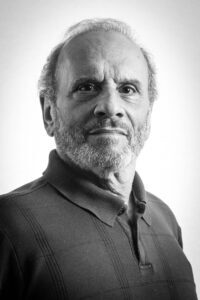
Nick Chiarkas grew up in the Al Smith housing projects in the Two Bridges neighborhood on Manhattan’s Lower East Side.
When he was in the fourth grade, his mother was told by the principal of PS-1 that, “Nick was unlikely to ever complete high school, so you must steer him toward a simple and secure vocation.” Instead, Nick became a writer, with a few stops along the way: a U.S. Army Paratrooper; a New York City Police Officer; the Deputy Chief Counsel for the President’s Commission on Organized Crime; and the Director of the Wisconsin State Public Defender Agency.
On the way to becoming an author, he picked up a Doctorate from Columbia University; a Law Degree from Temple University; and was a Pickett Fellow at Harvard. How many mothers are told their children are hopeless? How many kids with potential simply surrender to despair? That’s why Nick wrote Weepers and Nunzio’s Way—for them.
To learn more about Nick, click on any of the following links: NickChiarkas.com, Goodreads, BookBub – @AuthorNickChiarkas, Twitter – @chiarkas & Facebook – @NicholasChiarkasAuthorVisit all the Stops on the Tour!
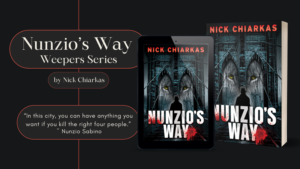
10/24 Review @ I Read What You Write
10/24 Showcase @ BOOK REVIEWS by LINDA MOORE
10/25 Showcase @ 411 ON BOOKS, AUTHORS, AND PUBLISHING NEWS
10/26 Guest post @ The Bookworm
10/27 Showcase @ Books, Ramblings, and Tea
10/28 Guest post @ The Mystery of Writing
10/30 Review @ Guatemala Paula Loves to Read
11/08 Showcase @ Celticladys Reviews
11/09 Review @ Book Reviews From an Avid Reader
11/1 Interview @ I Read What You Write
11/13 Review @ Paws. Read. Repeat
11/16 Guest post @ The Reading Frenzy
11/18 Review @ The Page Ladies

 All We Buried, available now in print, e-book, and audio.
All We Buried, available now in print, e-book, and audio.
Silver Falchion Award Finalist, Best Investigator
Foreword INDIE Award Finalist, Best Mystery
The Foundation of Plot, a Wait, Wait, Don’t Query (Yet!) guidebook.
The post Nunzio’s Way: Historical Thriller appeared first on The Mystery of Writing.
October 26, 2022
The Swordsman of Venice: Novella
The Swordsman of Venice: A novella by Rob Samborn
Spotlight + Book & Author InfoFor more new authors and books, click the link here.The Swordsman of Venice
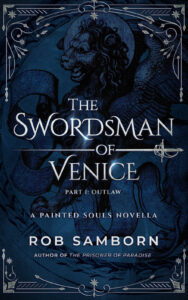 They stole his love.
They stole his love.
They’ll pursue him across the oceans.
He will kill—or die—to save her.
Part I: Outlaw
1589 A.D. The Republic of Venice.
After Angelo Mascari is thrust into a dubious plot that ends in disaster, the elite swordsman is forced to flee his home with nothing but a few coins, his rapier, and a vague instruction to save his beloved Isabella: travel to the New World.
But the Doge of Venice believes Angelo stole a mysterious book that holds the key to unlimited power. With the sands of time rapidly falling, the doge’s ruthless men are on the hunt. They’ll stop at nothing until they capture Angelo and return him to the City of Masks.
To save Isabella, he must become an outlaw.
To purchase The Swordsman of Venice, click on the following link: AmazonThe Swordsman of Venice is a standalone novella set in the world of Rob Samborn’s award-winning Painted Souls series, including The Prisoner of Paradise and Painter of the Damned.
Keep your eyes out for our upcoming interview for the release of Painter of the DamedLaunching October 26
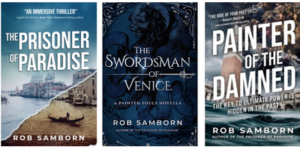
 In addition to being a novelist, Rob Samborn is a screenwriter, entrepreneur and avid traveler.
In addition to being a novelist, Rob Samborn is a screenwriter, entrepreneur and avid traveler.
He’s been to forty countries, lived in five of them (including Italy) and studied nine languages.
As a restless spirit who can’t remember the last time he was bored, Rob is on a quest to explore the intricacies of our world and try his hand at a multitude of crafts; he’s also an accomplished artist and musician, as well as a budding furniture maker. A native New Yorker who lived in Los Angeles for twenty years, he now makes his home in Denver with his wife, daughter and dog.
For more information visit www.robsamborn.com or click on any of the following links: facebook, instagram, goodreads, twitter, tiktok & bookbubElena Taylor/Elena Hartwell
 All We Buried, available now in print, e-book, and audio.
All We Buried, available now in print, e-book, and audio.
Silver Falchion Award Finalist, Best Investigator
Foreword INDIE Award Finalist, Best Mystery
The Foundation of Plot, a Wait, Wait, Don’t Query (Yet!) guidebook.
Header image by cocopariesienne on Pixabay
The post The Swordsman of Venice: Novella appeared first on The Mystery of Writing.
October 25, 2022
A Nest of Snakes: Debut Thriller
A Nest of Snakes, debut novel by Deborah Levison
Author Interview + Book & Author Info + Author Pet Corner!Don’t miss any Author Interviews! Click the link here.A Nest of Snakes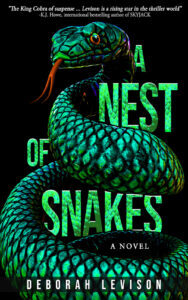 Brendan Cortland is a broken man. Middle-aged, pasty, pudgy, and fearful, he suffers from chronic depression, nightmares, and agoraphobia. His contact with the outside world is limited to trolling chatrooms, where he hunts pedophiles, and a weekly session with his psychiatrist, to whom he describes dreams of being devoured by predators. The doctor suspects catastrophic abuse, and maybe something more; but in all his years of therapy Brendan never divulged the deepest source of his trauma.
Brendan Cortland is a broken man. Middle-aged, pasty, pudgy, and fearful, he suffers from chronic depression, nightmares, and agoraphobia. His contact with the outside world is limited to trolling chatrooms, where he hunts pedophiles, and a weekly session with his psychiatrist, to whom he describes dreams of being devoured by predators. The doctor suspects catastrophic abuse, and maybe something more; but in all his years of therapy Brendan never divulged the deepest source of his trauma.
Pushed to his breaking point, Brendan embarks on a quest for justice. It’s the terrifying step he’s avoided for decades: going public with his story. His lawyer warns him that testifying might mean dredging up painful memories, ones he’d rather keep buried.
Still, no one is prepared for the horrible secrets and revelations that emerge during the trial … least of all Brendan himself.
Reviewers call A NEST OF SNAKES “heart wrenching,” “raw and compelling,” “unforgettable,” and “a roller-coaster ride of surprising twists” leading to a “staggering climax” and an “absolutely perfect” ending. Monster Librarian hails A NEST OF SNAKES as one of the fall’s most talked-about novels.
When we first meet him, Brendan is a broken man, struggling with chronic depression, nightmares, and agoraphobia. He’s barricaded himself in his Connecticut mansion, surrounded by extravagant and bizarre purchases, and lives a solitary existence with only a surly housekeeper and her son for company.
His contact with the outside world is limited to shopping online and a weekly session with his psychiatrist, to whom he describes terrifying dreams of being devoured by hordes of predators, usually snakes. We learn off the bat, though, that Brendan has become something of a computer whiz and spends a lot of time trolling clandestine chatrooms, hunting pedophiles.
Immediately, we suspect abuse.
The story opens on Brendan’s forty-seventh birthday. He is more despondent than usual because his young son didn’t even call or text. Longing to heal, desperate to feel “normal” in the eyes of his estranged family, Brendan decides to go public with his story and file a lawsuit against the elite New England private school he attended as a boy. But as he preps for trial, Brendan is forced to dredge up the painful memories he kept buried for decades.
I feel very protective of Brendan. He was such an interesting character to write, especially as I majored in psychology, which made the research part fun. I’m cheering for him as he embarks on his quest for justice, and his journey of healing.
A Nest of Snakes is your first novel. What was your publishing journey like for your fiction debut?Back in my twenties, I itched to write my first novel. While I was on maternity leave with my newborn, I figured I’d write while she napped. Well, she was a really good napper, so I wrote a 120,000-word manuscript and shipped it off to the slush piles of the Big Five.
I received a letter from an editor in return. She said my “narrative and flair for dialogue” were “extraordinarily strong.” She said she was “taking the liberty of showing it around the office.” She said, “I do hope you haven’t been snatched up by another publisher.” (I still have the letter.) Then she listed the edits required and said she’d be happy to take a second look after I made the changes.
What did I do? Nothing. Did I edit accordingly, and resubmit? Nope. I let that manuscript sit on a shelf collecting dust. How stupid could I have been? To be fair, I did have two more babies, and did move from Canada to the States, and did get a bit sidetracked with a new career and a new life.
Still — epic fail.
Years later I realized my dream of becoming an author with my true crime book, The Crate. It was a brutal process, though… I queried and signed with an agent, who got me a great book deal with a New York publisher. I fantasized about lunches at the Plaza Hotel with my acquiring editor. That editor left the publishing house, leaving my book orphaned; they dropped it a year later, on my birthday. The agent and I parted ways, and I had to start from scratch. I found a new agent, and a new book deal with WildBlue Press, who is also publishing A Nest of Snakes.
What drew you to writing about childhood abuse in A Nest of Snakes ?A few years ago, there was a spate of lawsuits in Connecticut, where middle-aged men alleged abuse at the boarding schools they attended as boys.
I read through several complaints and I was just horrified. I couldn’t believe what had happened to these children, how vulnerable they were, how they’d been preyed upon, and how many adults were complicit in the abuse. Literally everyone at the schools knew what was happening and no one intervened. No one reported the abuse, and no one protected the victims. And of course, the abuse wasn’t limited to Connecticut by any means; it happened everywhere, from Horace Mann in New York City, to Exeter in New Hampshire, to Upper Canada College in Toronto, to Dublin, Johannesburg, Sydney.
And it hasn’t stopped.
Just this summer the Crown Prince and Princess of Denmark pulled their 16-year-old son out of his prestigious boarding school amid allegations of rampant abuse to which the leadership turned a blind eye. I just think it is such an important story to tell. And a little part of me is hopeful that the book might actually help someone who has been abused and feels alone.
The Crate, your nonfiction book published in 2018, earned much critical acclaim. Tell us about that project:Thank you for that!
But really, The Crate is not a book I ever thought I’d write. It’s the true story of a grisly crime that rocked my family. We discovered a wooden crate, nailed tightly shut and hidden underneath our cottage by a lake. Inside was… awful.
The discovery left us reeling. My brother became a murder suspect, my husband and I were totally freaked out, and we had three young kids to shield from the situation. But worse, my elderly parents were traumatized. The discovery dredged up their terrible memories of the Holocaust — of surviving ghettos, death marches, concentration camps.
Those first days after the discovery of the crate were filled with shock and horror and a huge sense of violation. But once police identified the victim, and once we learned the circumstances that led to the crate being found on our property, I realized I could give the victim a voice. I wanted to honor her memory… just as I wanted to preserve my parents’ stories from the Holocaust.
The Crate is a nonfiction (true crime) story, and yet there are lots of overlapping themes between it and A Nest of Snakes. Can you describe a few?You’re absolutely right – both books share themes, like the oppressive weight of memory, the evil that man is capable of, and how trauma can bubble up from the past and ripple out for generations.
As a daughter of Holocaust survivors, I guess I’m drawn to exploring those themes. In A Nest of Snakes, I also wanted to call out social issues that need attention, like child abuse, bullying, and the machismo culture that still proliferates in our society.
What are you working on now?I’m a few chapters into a new thriller, but sort of came to an impasse in the plot. I’m not liking the direction the story has taken, so I have to backpedal.
I’m a failed plotter: I buy stacks of neon sticky notes and giant Bristol boards, with every intention of mapping out the entire story… and before I know it, my chapters are taking off in directions I hadn’t intended.
Whichever way this goes, though, I think it will end up being quite dark.
I think of them as the 5 Ps.
Product. Whether you are traditionally published or self-published, you have to start with a great product, that is, a well-written book that provides value to the reader. That’s true for nonfiction, whether it’s a business book, a self-help, a cookbook, a biography, whatever… it must have informative value.
If it’s fiction, of course it needs entertainment value, but it also needs to be credible. And, if you are self-publishing, the finished product must look professional – polished inside and out. You may want to hire a developmental editor to help the story along, and hire a copy editor to make sure the copy is impeccable. You’ll probably want to shell out for the cover art, too.
Patience. This is so hard! I’ve learned that the process of getting published can be agonizingly slow. On average, traditional publishers can take from nine months to two years to put out a book. Ugh, that’s a long time when you are anxious to get going. Agents, editors, and publishers have their own timelines that don’t necessarily align with yours, so patience, in publishing, sure is a virtue.
Perseverance. How bad do you want it? Dealing with rejection is no picnic, but it helps to realize right off the bat that not everything is going to go your way. Rejection is part and parcel of the publishing industry. So are setbacks that are entirely out of your control. Like a global pandemic, for instance. Keep your eyes on your goals and don’t get derailed by delays, impediments, rejections, and other hurdles.
There are scores of bestselling authors who were repeatedly rejected before publication, or who wrote three, four, five or more different manuscripts before they became an “overnight” success.
Public speaking. It’s probably better that I didn’t realize beforehand that this requirement existed. My fear of public speaking bordered on terror. Little did I know how many author talks and presentations I’d have to give. The really cool thing is I’ve come to enjoy it — the opportunity to connect with readers has been fantastic.
Publicity. Someone told me, “Writing the book is the fun part… marketing it is the hard work.” So true! Fortunately, there are myriad ways to market a book.
Great advice!Author Pet Corner! Gigi!
Gigi! Moose!
Moose!Moose (seven years old, from Ohio) and Gigi (two years old, from Mississippi) are both Aussiedoodles
(Australian shepherds mixed with poodles)
and they’re so smart and affectionate and playful…
they bring so much joy to my family.
I could spend all day talking about them.
Adorable!
Deborah Levison — Author of A Nest of Snakes

Deborah Levison is an author and publicist. Her life has two parts: the first in Canada, where she attended University of Toronto and the Royal Conservatory of Music, and the second in Connecticut, where she lives with three children, two doodles, and one husband.
Her first book, a nonfiction called The Crate, is a true crime story with echoes of the Holocaust. Reviewers called it “gorgeous and poetic,” “heart-wrenching,” and “a brilliant story.” The Jerusalem Post wrote: “exquisite.” The book won seven literary awards.
Levison’s debut novel, A Nest of Snakes, is part thriller, part courtroom drama based on real-life events. Reviewers call it “raw and compelling,” “unforgettable,” and “a roller-coaster ride of surprising twists leading to a staggering climax and an absolutely perfect ending.” Monster Librarian hails A Nest of Snakes as one of the fall’s most talked-about novels.
To learn more about Deborah, click on any of the following links: Website, Facebook, Instagram & TwitterElena Taylor/Elena Hartwell
 All We Buried, available now in print, e-book, and audio.
All We Buried, available now in print, e-book, and audio.
Silver Falchion Award Finalist, Best Investigator
Foreword INDIE Award Finalist, Best Mystery
The Foundation of Plot, a Wait, Wait, Don’t Query (Yet!) guidebook.
Header image from paulbr75 on Pixabay.
The post A Nest of Snakes: Debut Thriller appeared first on The Mystery of Writing.



